#narrative essay writing in english
Explore tagged Tumblr posts
Text
youtube
For every student a question like “How to Write a Narrative Essay?” is a pain, and when it is a specific essay the pain grows to the next level. But to cure this pain, we have a team of experts at your fingertips.
Instant Assignment Help has created this video to help you prepare a perfect narrative essay with some of the most useful tips to your rescue. By using these 6 tips you are guaranteed to get amazing grades and top the class. You will learn all about ways to perfect your essays.
#narrative essay#narrative#how to write a good essay#english grammar#narrative writing#how to score full marks in essay writing#how to score full marks in essay#how to score full marks in narrative writing#how to score full marks in essay class#narrative essay format#narrative writing essay in#narrative essay writing in english#narrative essay examples#write a perfect narrative essay#how to write a narrative essay?#essay writing tips#writing tips for students#Youtube
0 notes
Text
For the love of all things holy please, please, if you are applying to an institute of higher education, DO NOT USE CHATGPT. I promise you that if I, a person who makes college application essays suck less in exchange for ready money, can tell within two sentences, an admissions officer reading thousands of the things can tell at first glance. We don’t even need the fucking AI detector. They’re just bad. They’re so bad. They’re appallingly bad. And they’re INSIDIOUSLY bad. It is so much harder for me to remove their insidious bland meaningless marketingese than it is for you to say everything you want to say, hammer it into a roughly organized form, and pay me six cents a word to help you tell your story in an organized, coherent, and effective way. I promise you, it is easier. And your essay will actually get through the automatic AI detectors and to a real human being.
And if you don’t wait until THE DAY OF THE DEADLINE, I can even teach you how to do the thing I do yourself, so you are never tempted to turn to that dealer of less-than-mediocrity again.
I’m very good at this. Trust me, you do not want to use ChatGPT at any point in this process, not for ideas or spell check or language tweaks. It will only make things worse.
#I should start charging extra for fixing ones drafted or revised by the devil#college applications#feel my eye twitching#normally I work with people for whom English is a second language#who have excellent things to say and slightly dubious grammar#and a lack of familiarity with English narrative essay structure#also a lot of compsci folks who can write beautifully in C++ and not at all otherwise#my favorites to work with are the rare ones who actually want to know what I’m doing and why and how they can do it#I had a great one once#we worked on her essays over two months#and I did no direct rephrasing at all#she wanted to know how to do it#and she learned beautifully#I do not do academic essays though#that is what the college writing center is for
5 notes
·
View notes
Text
guys i saw a marauders fan in the wild today
like in real life. holy fucking shit
we get each other
hearing the word jegulus spoken aloud is so surreal like…this isn’t a fever dream oh my god
we have brainrot about the same fandoms ong
#im so happy#because today we had to write an essay#and this person was like “the fanfic writers r gonna eat with this one”#it was like narrative writing or wtv#or creative writing#same thing#anyways#i was like “yeah fanfic is the only reason im good at english lmao”#and then it devolved into telling each other about what our fandoms were#apple rambles
2 notes
·
View notes
Note
Don’t hide it in the tags. The whole post was excellent 10/10 I’m sold. Couldn’t fully make sense of the show’s intentions but this is fascinating �� writing English papers and analyzing BBC Merlin prepared you for this.
aw shucks 🥰 i try my best
#i am actually writing an essay about lmk’s narrative mechanics#for fun#it was never assigned to me#i showed one of my besties and she just stared at me like ‘how did you NOT know you were an English major’#was i gobsmacked? yes#was she wrong tho? no she was 100% right#asks
2 notes
·
View notes
Text
Hey guys remember when I used to vaguepost so hard about my opinions? That was funny lmao anyway I hate whiteknight so much and I’m not afraid to say it
#and it’s not just bc I will live and die by the fact that weiss Schnee is a girl kisser#it’s mostly because I genuinely think it would be an awful narrative choice to have her end up with him#I’m an English major so I know these things#i could honestly write a full academic essay in MLA format about this#the only reason I haven’t yet is bc it feels wrong to put so much energy into ship hate#but also#literary analysis is fun#and so is being a hater (in a silly goofy way)#rwby#weiss schnee#pocketweiss originals
8 notes
·
View notes
Note
you seem to have a wide taste in books !! what are some books that you would recommend ??
Hmmm I wonder. I have the feeling I just read the same couple of books over and over, and at times only different iterations of the same story, like in that line by Borges ("the various intonations of a few metaphors").
I find recommending books without knowing anything at all about the person asking rather difficult. What I'd suggest to one may differ greatly from what I'd recommend to someone else. I'll give a list of some of my favourite books that I think are enjoyable in general:
— Thoughts by Pascal
— Cain: a mystery by Lord Byron
— The Iliad by Homer
— Crime and Punishment by Dostoievsky
— Othello by Shakespeare
— Pedro Páramo by Juan Rulfo
— Cyrano de Bergerac by Edmond Rostand
— The fragments of the Presocratics
— La Regenta by Leopoldo Alas, Clarín
— Tractatus Logico-philosophicus by Wittgenstein
— East of Eden by John Steinbeck
— Vita nova by Dante
— Contributions to the Founding of the Theory of Transfinite Numbers by Georg Cantor
— Caligula by Albert Camus
— North and South by Elizabeth Gaskell
— Peter Pan by J. M. Barrie
— Some essays by Russell. I personally love Mysticism and Logic
— Metamorphoses by Ovid
Poetry is perhaps harder to recommend because at times it translates horribly, but in general I love Baudelaire, Rimbaud, Lorca, Juan Ramón Jiménez, Rilke, Byron, Quevedo, Góngora, Lope de Vega, Horace, Catullus, Ovid, Tennyson, Maiakovsky, Garcilaso de la Vega, Oliverio Girondo, Vicente Huidobro, Emily Brontë, T. S. Eliot, Luis Cernuda and Edgar Allan Poe, to name a few.
#I talk too much#I wanted to say The tragic sense of life by Unamuno and Philosophy and Poetry by María Zambrano#but I thought maybe they'd be hard to find in translation. They're both approachable texts of philosophy beautifully written though#Unamuno's essay Vida de Don Quijote y Sancho (translated as Our Lord Don Quixote in English according to Wikipedia?) is also beautiful#I adore Schopenhauer and Nietzsche but I'm not sure I'd recommend them to anyone. Probably you can't go wrong with Kierkegaard though#I know what some of these books look like (like Wittgenstein's Tractatus or Cantor's Foundations)#but I swear they're approachable without specific academic background. The last line of Wittgenstein's Tractatus is one of my favourite#lines ever in the history of anything‚ philosophy or literature‚ but to be as hitting as it is you need to reach it at the end of the book#I think despite what it looks like both Cantor and especially Wittgenstein have an aesthetic intent in their writing#Wittgenstein in particular reminds me of Kierkegaard and Rilke and also of Unamuno and Zambrano. And of course Schopenhauer et al.#The Tractatus is very similar in my opinion to Huidobro's Altazor which is just amazing but I don't know how it would translate#These books I like in form and not just in content (although form is content like I think happens in Wittgenstein's Tractatus)#so when possible I'd read them in their original languages.I myself can't read German and know but very little of Russian and Ancient Greek#and a bit of Latin so I must be missing a lot of those. Nonetheless they're great in what I can get through translation#Perhaps you'd have the chance of enjoying them in full#If you can't read Russian I am actually quite specific with the translation of Crime and Punishment haha There's a concept#Razumikhin develops through the book at several points and often translators aren't consister with the word which makes the readers lose#the view of this development. And I happen to think the development works alongside the narrative of Svidrigailov#and also with what happens towards the end with Porfiry and Raskolnikov so I think it's important#In English there are several translations that maintain the coherence such as the one by Pevear and Volokhonsky#(the only one I can remember right now but I could check the rest). Garnett's translation is everywhere but that one doesn't do it#Hmmm Pedro Páramo in English takes some liberties and La Regenta isn't as funny which is what happens with Wuthering Heights#and The three musketeers in translation even when the translations are more accurate#I haven't recommended Wuthering Heights because I take you've read it but that's my favourite book#And I haven't recommended Pandora Hearts because that's a manga and you asked for books but it does some very interesting things#that I think are in line with many of the books listed here (as I said‚ I basically like the same few things retold over and over haha)#There are many books I am itching to recommend but that I can't do freely without some knowledge of the person asking#Like Steinbeck's arthurian novel or idk Gone with the wind#I hope this list is enjoyable enough. I'm not sure if I've been able to avoid being too partial#I suppose one has to bear the conditions of their existence and can't ever entirely get rid of themselves haha
19 notes
·
View notes
Text
people who like math and are mad that no one else does think they are the most persecuted people on earth lmao. this isn’t even hate it is just genuinely hilarious to me
#like people will write whole essays about how awful it is that math class sucks and people don’t like it#which i get! because i have written long posts about the sorry state of literature education and how more people would enjoy analysis if#they did it better#but i also remember being in high school where the entire narrative was that every single person needed to have advanced math skills or they#would simply never be successful at anything#so seeing people being like oh woe 🥺 why don’t people care about math is just funny#see if your favorite subject had been english or history or any art you would be used to nobody giving a shit about your favorite thing
1 note
·
View note
Text
At the outset of H. G. Wells’s The War of the Worlds (1898), Wells asks his English readers to compare the Martian invasion of Earth with the Europeans’ genocidal invasion of the Tasmanians, thus demanding that the colonizers imagine themselves as the colonized, or the about-to-be-colonized. But in Wells this reversal of perspective entails something more, because the analogy rests on the logic prevalent in contemporary anthropology that the indigenous, primitive other’s present is the colonizer’s own past. Wells’s Martians invading England are like Europeans in Tasmania not just because they are arrogant colonialists invading a technologically inferior civilization, but also because, with their hypertrophied brains and prosthetic machines, they are a version of the human race’s own future.
The confrontation of humans and Martians is thus a kind of anachronism, an incongruous co-habitation of the same moment by people and artifacts from different times. But this anachronism is the mark of anthropological difference, that is, the way late-nineteenth-century anthropology conceptualized the play of identity and difference between the scientific observer and the anthropological subject-both human, but inhabiting different moments in the history of civilization. As George Stocking puts it in his intellectual history of Victorian anthropology, Victorian anthropologists, while expressing shock at the devastating effects of European contact on the Tasmanians, were able to adopt an apologetic tone about it because they understood the Tasmanians as “living representatives of the early Stone Age,” and thus their “extinction was simply a matter of … placing the Tasmanians back into the dead prehistoric world where they belonged” (282-83). The trope of the savage as a remnant of the past unites such authoritative and influential works as Lewis Henry Morgan’s Ancient Society (1877), where the kinship structures of contemporaneous American Indians and Polynesian islanders are read as evidence of “our” past, with Sigmund Freud’s Totem and Taboo (1913), where the sexual practices of “primitive” societies are interpreted as developmental stages leading to the mature sexuality of the West. Johannes Fabian has argued that the repression or denial of the real contemporaneity of so-called savage cultures with that of Western explorers, colonizers, and settlers is one of the pervasive, foundational assumptions of modern anthropology in general. The way colonialism made space into time gave the globe a geography not just of climates and cultures but of stages of human development that could confront and evaluate one another.
The anachronistic structure of anthropological difference is one of the key features that links emergent science fiction to colonialism. The crucial point is the way it sets into motion a vacillation between fantastic desires and critical estrangement that corresponds to the double-edged effects of the exotic. Robert Stafford, in an excellent essay on “Scientific Exploration and Empire” in the Oxford History of the British Empire, writes that, by the last decades of the century, “absorption in overseas wilderness represented a form of time travel” for the British explorer and, more to the point, for the reading public who seized upon the primitive, abundant, unzoned spaces described in the narratives of exploration as a veritable “fiefdom, calling new worlds into being to redress the balance of the old” (313, 315). Thus when Verne, Wells, and others wrote of voyages underground, under the sea, and into the heavens for the readers of the age of imperialism, the otherworldliness of the colonies provided a new kind of legibility and significance to an ancient plot. Colonial commerce and imperial politics often turned the marvelous voyage into a fantasy of appropriation alluding to real objects and real effects that pervaded and transformed life in the homelands. At the same time, the strange destinations of such voyages now also referred to a centuries-old project of cognitive appropriation, a reading of the exotic other that made possible, and perhaps even necessary, a rereading of oneself.
John Rieder, Colonialism and the Emergence of Science Fiction
#words#hg wells#fiction#science fiction#colonialism and the emergence of science fiction#john rieder
478 notes
·
View notes
Text

Reo Mikage is Actually Great BPD Representation- Some Thoughts

So I had the extremely unfortunate experience of being exposed to Blue Lock (unfortunate because it's all my tiny pea brain can think about now), and while it is absolutely full of silly guys whose brains I want to pick, this little bugger really stood out to me. The second he came onto the screen, I KNEW I smelled the borderline on him. As I watched the series and read the manga, I noticed he is actually an incredibly well-written depiction of someone struggling with BPD. Reo is a super layered character and my favorite hobby is picking apart those layers and yapping incessantly about them, so here we are. I want to write this analysis for a few reasons:
1.) Too many people misunderstand Reo and categorize him as dramatic or childish without any elaboration and he deserves a proper character deep-dive. I think him being borderline explains a LOT of his reactions/choices throughout the story.
2.) Borderline representation is extremely important to me. I'm diagnosed borderline and have struggled with this disorder for around ten years now, so I get really excited when I spy BPD-coded characters (especially if they're likable people and not just ghoulish irredeemable villains or manic pixie dream girl characters). This disorder can be so isolating, especially when the majority of people will never even bother to research or understand it. I know that some people like to chalk Reo's emotional reactions up to him being a moody 17-year-old, but I think I have enough evidence to prove that this is undiagnosed BPD that's festering in his noggin. Not to mention, literally nobody else acts like this in the series. Reo is incredibly unique and distinct in the way he behaves through this narrative and I think it's way past the point of normal teenage angst. Regardless, believe what you want. He'll always be my borderline princess tho <3
3.) I have a master's degree in English and what good is that if I don't write long, painful, pointless essays on anime guys? Not that this is exceptionally well written, I just like to laugh at myself for getting a whole M.A and then this is the shit I publish online lmao
By the end of this, I hope I can shed some light on wtf is going on inside of Reo's silly little head. (I'm also obviously not a psychologist, don't use any of this to diagnose yourself pls I don't need the scandal)
If you want to read, buckle up, because this is gonna be a long one!
First, let me define BPD- It's a personality disorder characterized by a long-standing pattern of instability in mood, interpersonal relationships, and self-image. At its core, it is a disorder categorized by emotional dysregulation (the inability to regulate one's emotional responses) People with BPD feel everything EXTREMELY hard. That's important to keep in mind IMO, because while their reactions may seem dramatic or extreme, what they're feeling IS dramatic and extreme. Everything they're feeling is amplified, so their reactions are amplified. Obviously from the outside, people assume it's an overreaction since they can't see what's going on inside the borderline's head. When you sit down and dissect the thought process of someone like Reo, it becomes a lot easier to understand why they react the way that they do to certain situations.
(Also, I'm not going to reiterate more than once that an explanation is not an excuse to treat people poorly. I cannot read ANYTHING on BPD without hearing every 2 minutes how the disorder isn't an excuse to hurt other people. We get it!! I'm explaining it, not excusing it. This enter essay is an analysis of why someone acts the way they do, not whether or not it's excusable)
So then, what behaviors/signs does somebody need to exhibit to receive a borderline diagnosis? The 9 diagnostic criteria for BPD are as follows:
1. Fear of abandonment
2. Unstable or changing relationships
3. Unstable self-image; struggles with identity or sense of self
4. Impulsive or self-damaging behaviors
5. Suicidal behavior or self-injury
6. Varied or random mood swings
7. Constant feelings of worthlessness or sadness
8. Problems with anger, including frequent loss of temper or physical fights
9. Stress-related paranoia or loss of contact with reality
Someone would only need 5 of these to receive a proper diagnosis. Just with the main story and the spin-off manga that is currently released, I think I have enough evidence to argue that Reo has 8 out of 9 criteria for a BPD diagnosis. For the sake of organization, I’m gonna group some of those together though, indicated by a + symbol. I also want to define a few important terms before I start yapping, so that y'all without BPD can understand wtf I'm even talking about.
Favorite Person (fp) - This is someone who holds massive significance in a borderline's life. They emotionally depend on this person a lot and to a certain extent, their worldview almost revolves around them.
Splitting- the change in perception of someone or something caused by black-or-white thinking or dichotomous thinking. It is the devaluation of someone who was once idealized and vice versa.
Mirroring (aka: the chameleon effect)- the constant, unconscious change in one's identity or sense of self by imitating another person’s behaviors, characteristics, or traits. It is common in people who have a vacant or distorted self-image which is a general symptom of BPD.
Now, time for me to break down the most prominent moments where Reo showcases borderline behavior. As I mentioned, I'm going to try and organize this under each criteria point (with some being grouped together)
Unstable self-image; struggles with identity or sense of self:
Before I delve into Reo's relationships, I want to start with his baseline sense of identity. It’s established early on that Reo is a very bored, empty, unsatisfied person. Nothing excites him, nothing motivates him, and everything is handed to him. He’s frustrated because his parents notoriously try and buy his affection even though he doesn't want anything. For most of his life up until the narrative starts, he's wandering through life empty and frustrated. That is, until he finally sets his sights on soccer and decides to dedicate his life to winning the World Cup:
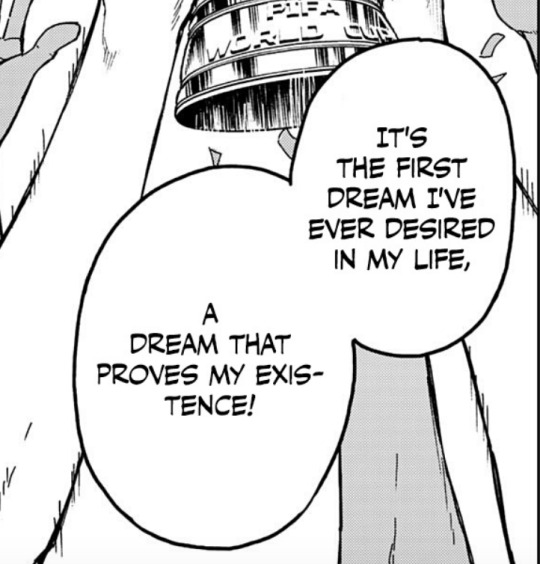
The wording, 'proves my existence' is interesting here. I think this is the first instance Reo has felt alive. So far, the only notable thing about him has been his family and his money. He hasn't achieved anything exceptional for himself, but now he has that opportunity. With this goal, he can really build something up from nothing and make it his own. It's almost like he's clinging to this dream to prove that he has some purpose in his life other than being the family heir.
Now, this dream changes when he meets Nagi, of course. I'm not gonna focus too much on their relationship in this section, but I will mention that meeting Nagi shifted Reo's entire dream, and not for the better. Through the narrative, his dream went from:
Winning the World Cup
Winning the World Cup with Nagi
Proving to Nagi that leaving him behind was a mistake
Improving himself and becoming a good striker on his own
Being a tool for Nagi to become the best striker
Had Nagi not come in and ask for Reo to come back to him, I think Reo could have done a great job at establishing his own sense of identity without Nagi. But no matter how much he works on himself, with Nagi in the picture, he's never going to value himself more than Nagi. Reo lets Nagi cloud his identity to the point where Isagi calls him out and asks what he's even doing at Blue Lock in the first place, since he clearly can't survive on his own, he needs Nagi with him.
After dealing with the turmoil of being abandoned by Nagi, Reo goes through a few stages. He starts with wanting to become somebody worthy of being beside Nagi, somebody that Nagi would want to choose. Devoting himself to becoming stronger and more versatile, his end goal is to have Nagi realize he made a mistake by leaving him behind. After a few more matches, Reo starts to realize that he needs to grow and change and become a stronger, better version of himself for himself and not for other people.
He decides that the fight was all his fault to begin with, that he should have never forced Nagi to play soccer and now he is going to get back to what his dream was originally, combined with his new desire to be a stand-alone player (and person, for that matter). Reo accepts the mistakes that he made, admits that he shouldn't have forced his ideals onto Nagi, and resolves to become a better person for HIMSELF. That's excellent!
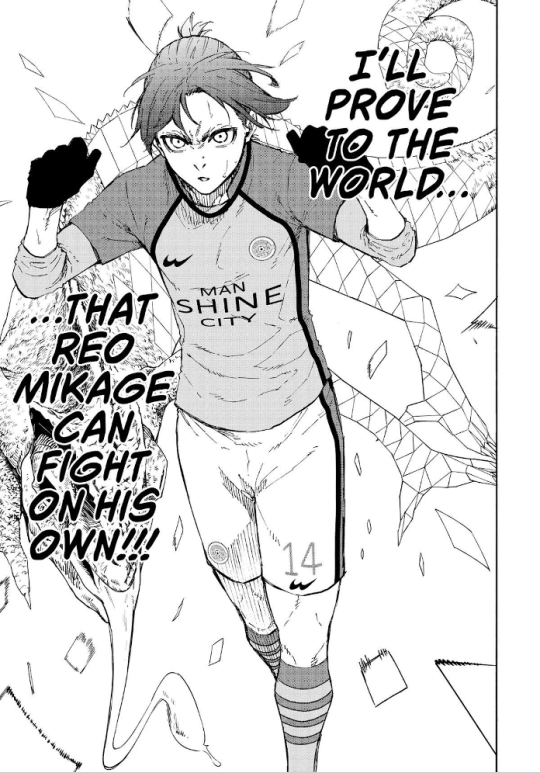
Of course, Reo can't be happy for TOO long. Nagi comes out of the woodwork saying that he can't beat Isagi on his own and asks for Reo's help. Reo does stand up for himself a bit, saying that Nagi is being inconsiderate of his feelings and mentioning how long it took for him to recover from Nagi leaving. Now, the BPD trait here is how Reo not only forgives Nagi and is jumping on him and hugging him THE NEXT PAGE, but he also just disregards everything he said in this sequence. In a matter of two minutes, he no longer wants to be a player that can fight on his own or improve for himself, he wants to improve for Nagi. He starts ruminating again about how hurt he was when Nagi left, but now he's saying all of it wasn't so that he could get stronger individually, it was so that he could be reunited with Nagi again. Nagi asking for his help and saying that now they can play together again motivate Reo more than anything we've seen so far. (Nagi notoriously throws Reo little affection crumbs like this that Reo eats up, but I'm not trying focus on that) Now, Reo's alright with being a tool for Nagi's success again. Everything that happened was supposed to make him stronger so he could be a better partner to Nagi, right? Reo also says as the chapter ends, to please let him be a part of Nagi's dream until Nagi becomes the world's best striker. That's literally so sad!
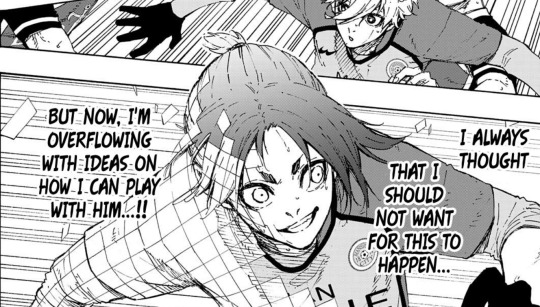

He's also immediately back to the 'our' 'we' 'us' talk as well. If he can master his chameleon style in order to keep Nagi above the rest of the players, he wont get left behind again. If he devotes his time and energy into being a solo striker like the rest of these guys, Reo knows that he wont be able to keep up. This was always supposed to be his role, right? Building Nagi up to his full potential! :*)
I also like the detail that Reo is back to hugging Nagi and holding him, but Nagi never really touches him back. I think Reo's love language is touch for sure, not that it's incredibly relevant, but I do think it shows that Reo is back to being 100% comfortable around Nagi as if their fight never happened. I hear a lot of fans asking how Reo could have forgiven Nagi so easily, and I say this with my entire chest, it's the BPD. The black-and-white thinking combined with Nagi being Reo's fp and the excruciating pain of being abandoned by him in the first place ?? Of course he's going to take him back. Also, I've seen people blame Reo for not saying no to Nagi when he asks for help and I have to say that is an absolutely insane take. How are we gonna look at a panel where Nagi asks for help and then blame Reo for helping him?? I'm not going to focus on it too much in this post but in my opinion, it is crazy how little accountability both the narrative + fans give Nagi. Reo is pegged as responsible for both of their downfalls and it's nuts tbh.
Currently in the story, I think Reo's identity is still centered around Nagi. It's really easy for borderlines to structure their entire lives and personalities around their favorite person, but I can only hope that these two keep having open and honest discussions with one another. Hopefully, Reo will eventually learn that he can exist without Nagi and that he's more than just 'his arms and legs'.
Unstable or Changing Relationships:
The most notable relationship in Reo's life is Nagi. They're both each other's first real friends, which already sets up a less-than-ideal dynamic. Nagi has no idea how to communicate and he has pretty weak emotional intelligence. On the other hand, Reo is great at communicating, but he isn't used to regulating his emotions. For a lot of borderlines, they can go a very long time without experiencing any symptoms when they don't have a favorite person. When you think about it, the bulk of the disorder is shown through those interactions with other people. If Reo has never had a real friend in his life, I don't think he'd be used to the emotional turmoil that comes with having a fp.
The minute Reo meets Nagi, he's attached. All his classmates notice it, too. They question why Reo is suddenly so obsessed with this random kid who has no interest in him. Reo is ignoring everybody that isnt Nagi.
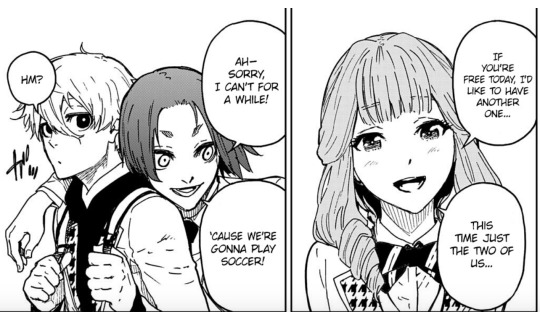
Very quickly, Reo boils down his view of the world to being him and Nagi versus everybody else, and he makes that very clear. It also depicts something that I think is incredibly crucial to Reo’s character that a lot of people overlook; as Nagi develops to be Reo’s favorite person, Reo’s dream isnt ‘playing soccer’ anymore. It’s Nagi. It’s being with Nagi, playing soccer with Nagi, being useful to Nagi, taking care of Nagi, and being somebody important to Nagi. He doesnt teach Nagi the rules or how to actually play, he teaches Nagi how to play with him. He literally re-writes and re-structures the game so that it can center around him and Nagi. Nagi calls him out on this in the spin-off manga:

Reo doesnt care about the structure of the game, he cares about Nagi. The other people on the field don't matter. The other team doesn't matter. He also starts to unknowingly put Nagi up on a pedestal, which is another borderline trait. He starts reiterating that Nagi is special, he's different from everybody else, he's destined to achieve great things. The more he raises Nagi up, the more he isolates the two of them in his mind, reiterating the idea that it's them against everybody else. His language reflects this too: Reo exclusively talks with 'us' 'we' 'our', insinuating that they're going to do everything together.

When Ego says that there can't be two winners, Reo says that he'll make Nagi the best striker. His 'ego' will be making Nagi successful. Along with putting Nagi on this pedestal, Reo also very early on establishes the fact that he'd pick Nagi over himself any day of the week. He's the only person in Blue Lock who really couldn't care less about becoming a striker himself: his dream is to be a tool in Nagi's success. Or, in simpler terms, he wants to be useful and make Nagi happy.
These two were in trouble from the very beginning. Nagi is lazy as all hell, has 0 motivation to do anything, and his dream is to live a life of luxury and never have to work. Reo, being the borderline baddie that he is, is more than happy to do EVERYTHING for Nagi. Borderlines love extremely hard! It's one of our best traits and I think it's important to showcase that Reo is a massive sweetheart at his core. He clearly loves Nagi a lot and goes to extreme lengths to make sure he feels taken care of. To someone with BPD, NOTHING is too big of an ask for a person they love, especially if that person is their fp. I also disagree with the argument that Reo 'made' Nagi codependent. Nagi likes being taken care of, he says it all the time. If you ask me, I would actually argue that Nagi takes advantage of Reo a little bit because he knows that Reo will do anything for him. But regardless, I think that Reo starts to develop an unspoken expectation with Nagi that he'll provide him with everything he needs, and in turn, Nagi will stick around. I don't think he's doing this intentionally, nor do I think it's being done in a manipulative way. I just think that Reo has a dormant fear of being abandoned that he doesn't totally know he has yet.
It isn't just Nagi that Reo showcases having unstable relationships with, though. Zantetsu is another good example. Reo starts out disliking Zantetsu, he snaps at him a couple times, and calls him a moron more than once. He starts to warm up to him because Nagi tells him to. The favorite person has MASSIVE sway in the borderline's life. If Nagi likes someone, Reo likes them too. (This is, of course, on the condition that they aren't a threat, looking at you Isagi).
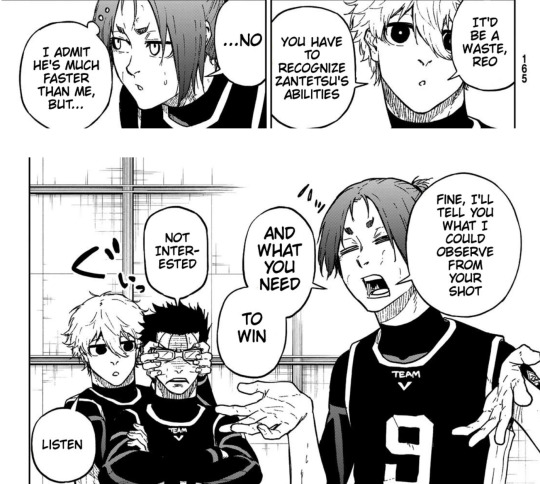
In the immediate next chapter, Reo is acting like they're all best friends. He's climbing on top of them in their big bed, saying that the three of them are gonna win their matches, being a little pookie. He goes from not liking this guy at all to considering him one of his close friends super fast. Also on the topic of Isagi, when they're making up the teams for the second selection, Nagi doesn't initially want to tell Reo that he wants Isagi on their team bc he's worried Reo will be upset. But, when he does finally say it, Reo is literally fine with it because like I said, who Nagi likes, Reo likes! On the condition that they don't replace Reo, which clearly happened soon after.
On the opposite side of the spectrum, Reo also shows how he can go from loving someone to despising him very quickly. After Chigiri and Kunigami tell him to get back up in the game post-Nagi's abandonment, we can literally see the switch flip in Reo's head:
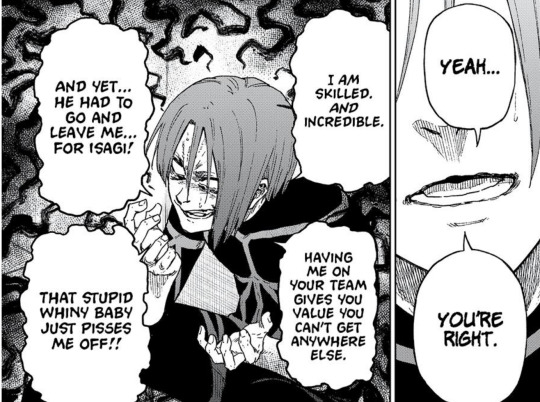
Suddenly, he hates Nagi. Nagi's a jerk who abandoned him; he never cared about him, and he threw him away. Dude literally says "Let's kill the bastards that betrayed us". This act of unintentional devaluing is called splitting. What Reo's essentially doing is going from one extreme to the other: if Nagi isn't his perfect treasure, he's the devil that broke his heart. There's no room for a grey area. The reasoning behind borderline's developing this black-and-white mindset is rooted in self-defense. If Reo devalues Nagi into being nothing more than a traitor, then he's stripping away the power that Nagi has to hurt him. If he looks at him like a rival or a villain, it's protecting him from being hurt by Nagi again.
That doesn't mean that he genuinely believes any of this, more so, he's trying to convince himself that it's true. We see that at his core, the reason he's acting like this is because he's hurt. I'll go more into it later on, but he's constantly thinking, what does Isagi have that I don't? What do I have to do in order to win Nagi back? This black-and-white thinking is an automatic self-defense mechanism that I think he's doing subconsciously. Regardless, the shifting he's doing here can cause a little whiplash, which brings me to:
Varied or random mood swings + Problems with anger, including frequent loss of temper or physical fights:
I can’t think of a better way to describe Reo's temperament than the wiki, so let me quote it: "Generally, he seems to feel every emotion with full force and is extremely aware of his own faults and shortcomings, which is evident in several instances of painful breakdowns shown in the spin-off manga. Due to his high emotionality, he can even get violent when he loses his temper."
Reo is characterized as being emotionally unstable. When he's happy, he's elated! When he's sad, he's miserable. There are a ton of scenes between the manga and spin-off manga that show how fast his emotions can flip, but this one was one of my personal favorites:
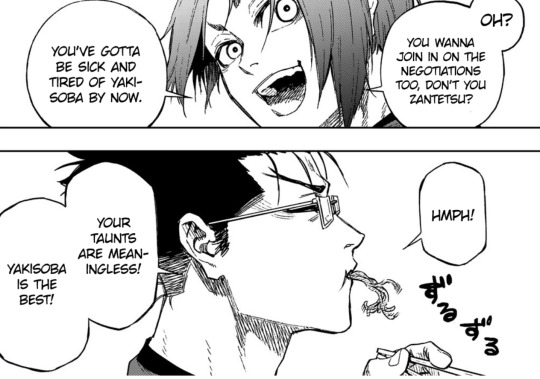

In this scene, Reo has developed a little scheme in the dining hall where the guys are trading their side dishes. At face value, a throwaway moment. But, I think it's worth looking at because not only does this show Reo's emotional response being triggered in an opposite, semi-extreme direction, but the root cause for the reaction was that he felt rejected by Zantetsu. In his own weird way, he's asking Zantetsu to come over and hang out with him. He's not being exceptionally clear with that message, but I can still pick up on it. "You wanna join in, don't you?" He's extending the invite, making himself vulnerable, and Zantetsu shoots him down by saying nah, I'm fine with my noodles. Reo JUMPS on him like YOU KNOW WHAT? I TOOK THAT PERSONALLY! lol. Jokes aside, I think this moment is a great one to argue Reo's BPD tendencies because it's such a seemingly mundane interaction. Even Zantetsu is surprised by Reo's random outburst. This also sets up the fact that one of Reo's most obvious triggers is being rejected/abandoned/betrayed, an extremely common one between those of us with BPD.
Other instances of Reo having a bad temper are a lot more obvious. In the match against teams V and Z, Reo straight up elbows Raichi in the throat, and then tries to go throw hands with Kuon for hurting Nagi. He only stops because if he gets into any more fights, he’ll get thrown out of the game and won't be able to play with Nagi anymore. He’s visibly pissed though and calls Team Z a joke. Hell, even Reo himself can recognize on a certain level that he can't control his emotions: they control him. They cloud his judgment and make him react in ways that he wish he didn't.

He is constantly plagued by these extreme emotional reactions that are out of his control. Not to say that people with BPD are unable to ever control their emotions, because we can! It takes time and therapy and practice though, which Reo hasn't had. His lack of regulation is also why he has such a dramatic and extreme meltdown when Nagi abandons him.
Fear of Abandonment:
Reo's biggest trigger and the cause of his inner turmoil throughout Blue Lock is his fear of abandonment. I mentioned before that I think he's had this fear dormant inside of him for a while as so many borderlines do, since he hasn't had the chance to experience it before. He alludes to it early on when they first arrive at Blue Lock:
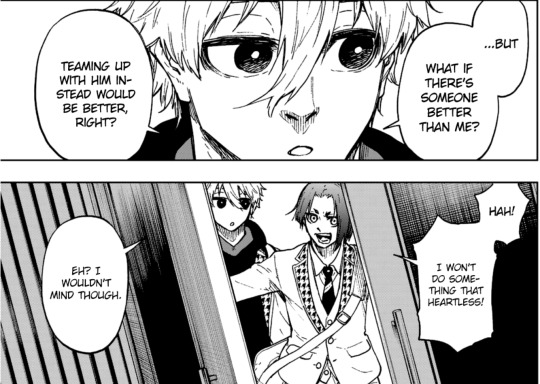
The thought of leaving Nagi for somebody else? Reo considers that heartless. They came together, after all. They're going to win the world cup together. Nagi could break both of his legs and Reo wouldn't leave him, because again, Reo isn't there to team up with the best player and become the best striker in the world: he's there to play with Nagi!! And, like I said, in Reo's mind it's him and Nagi vs everyone else-
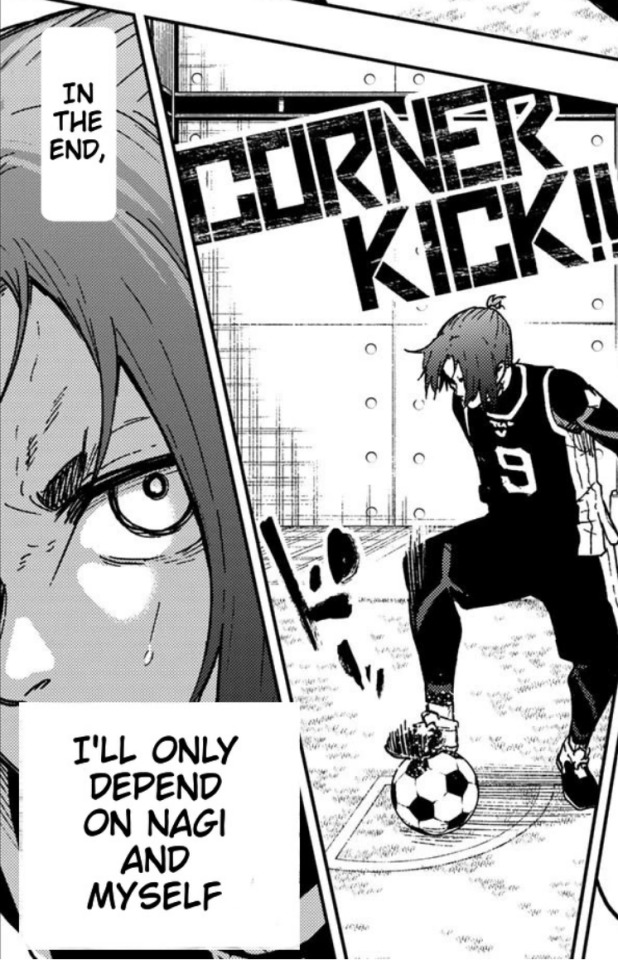
Reo exhibits a lot of signs early on of being jealous while they're playing in Blue Lock. I mean, as we discussed, everything should be focused around him and Nagi. When Nagi passes to Zantetsu in the team V and Y match, Reo pulls up like 'hey, why didn't you pass it to me?? ):' There are a lot of little moments like that, but Reo's jealousy is a lot more relevant to my argument after he gets abandoned by Nagi.
Let's talk about that word: abandoned. It seems dramatic, right? Reo uses that term constantly and exclusively. Every time he brings that moment up, he uses the word 'abandoned', or he'll say 'betrayed' or 'chose'. These are very definitive words. He’s not saying Nagi ditched him or flaked on him or blew him off, no; he has abandoned him. That word choice may seem disproportionate to the situation, but that's Reo's reality. This was the ultimate betrayal to him. The constant use of that vocabulary reiterates that in Reo's mind, there is no grey area. Either Nagi chooses him, or he chooses someone else. In choosing someone else, he abandons Reo. Reo is paranoid that Nagi isn't ever going to come back to him and it's because of something that Reo is lacking. How can Nagi like Isagi more than him, anyway?
Now, I do fault Nagi a bit for not communicating better at that moment. I understand that he's bad at communication, but I don't think Reo could have been more obviously upset if he tried. The dude was in TEARS. Nagi saw him devastated and then expected everything to be fine when he met him in the bathhouse? Idk. I'm going to give him the benefit of the doubt and say that he didn't realize it would upset Reo to such an extreme: maybe he thought that they would miss each other, but Reo wouldn't take it personally. I'm doing my best not to harp on Nagi since this is about Reo.
Abandonment is detrimental to people with BPD. It causes extreme inner turmoil that we see with Reo as the story progresses because it is the only thing he can think about. If he isn't trying to cover up his hurt feelings with this idea of revenge, he's self-destructing over being abandoned. He becomes obsessed with wondering why Nagi chose Isagi over him. Was there something wrong with him? Isagi isn't that impressive, why would Nagi rather be with him? These thoughts torture him endlessly and fuel his desire to 'steal' Nagi back. He literally says to Isagi, that he's going to steal Nagi back. Much to his dismay though, Reo starts to notice that Isagi is bringing out some positive traits in Nagi. Nagi's entire vibe is different with Isagi. Nagi is having fun playing soccer without Reo. In fact, he's having more fun. He's making plays he's never made before. His face is visibly different; he's more excited than before.
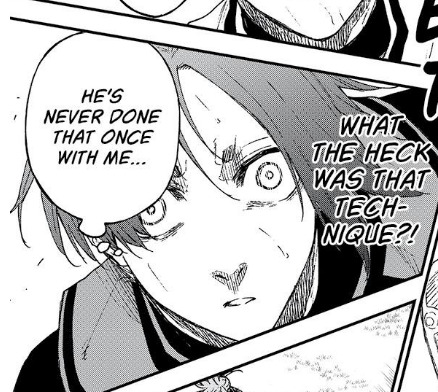
This is heartbreaking for Reo. Not only was he right that Isagi did have something to offer Nagi that he couldn't, but Reo is having a massive self-hate spiral during this point as well, so he's internalizing all of his flaws and mistakes while the thought is sitting in the back of his head: did Nagi actually have a good reason for abandoning me? Was I not enough to satisfy him? Did I only drag him down? This gets significantly worse the longer he watches Nagi and Isagi play:
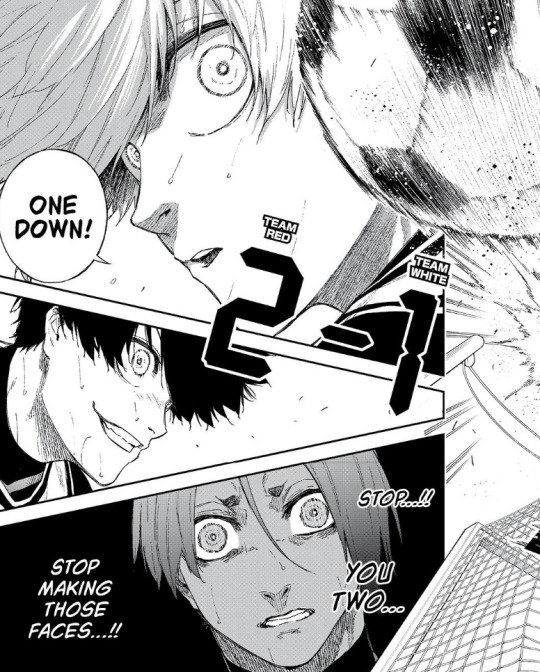
Everything is falling apart. Nagi is doing completely fine without Reo, and Reo is an absolute mess. We're circling back to Reo's lack of identity here as well. He's watching firsthand that he's losing Nagi to Isagi: what does he do? What happens to him if he loses Nagi, who is he without Nagi? He's overwhelmed during this match and at one point Reo literally screams that he's going to tear apart their connection. Jealousy is consuming him, but it's also those feelings of inferiority and wondering if he really did deserve to be abandoned. If Nagi is so happy without him, maybe he really did have a reason. These are the thoughts that are circling around in Reo's head. Not to mention, he is constantly tortured by the flashbacks of Nagi leaving him, which I think is a great detail. Some readers might say it's just pointless recapping but I disagree, I think it's depicting how traumatic that was for Reo. As a borderline, being abandoned by your fp IS traumatic. Reo relives that moment so many times because so many things trigger it for him throughout Blue Lock. He can't even look at Chigiri and Kunigami without thinking about him and Nagi. It's a really devastating experience that quickly deteriorates him emotionally.
Constant feelings of worthlessness or sadness + Suicidal behavior or self-injury:
One of my favorite things about Reo is the fact that he is self-aware that he's behaving somewhat irrationally, but he doesn't know how to stop. When we look at one of the several times that Reo is curled up crying over Nagi, he mentions how he really did want to tell Nagi to go and have fun, but he didn't. He couldn't. The visuals shift for this too:


Reo doesnt want to be acting this way, but he can't help it, and that's frustrating to him. It makes him start feeling ashamed of himself. His inner thoughts start to spiral and he feels weak and alone. He's reflecting here on what his true feelings really were at that moment, and how scared and lonely and weak he felt as a result of Nagi leaving him behind.
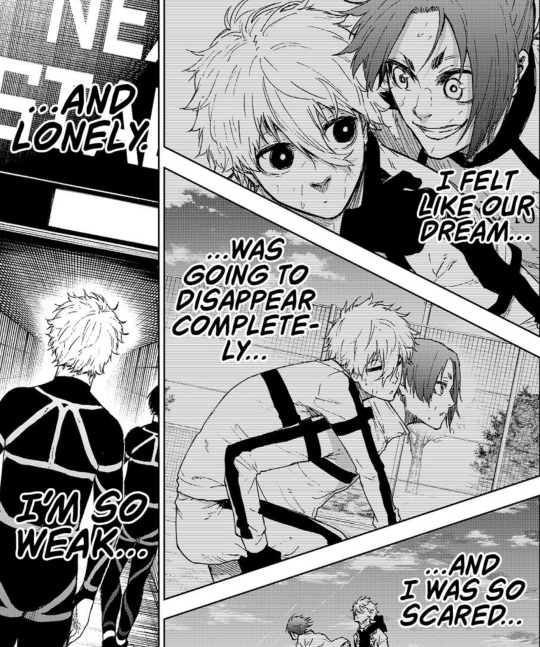
These feelings quickly evolve into Reo feeling worthless and falling into bouts of self-hatred. He's so ashamed of the way he's feeling and behaving but it feels so out of his control. He says, "maybe if I hadn't gone to Blue Lock in the first place, I wouldn't have to experience this feeling." As I said before, borderline's feel things EXTREMELY intensely; the disorder is described as living with third-degree burns all over your body. Everything hurts. His feelings are so intense and all-consuming right now, it's all he can think about:
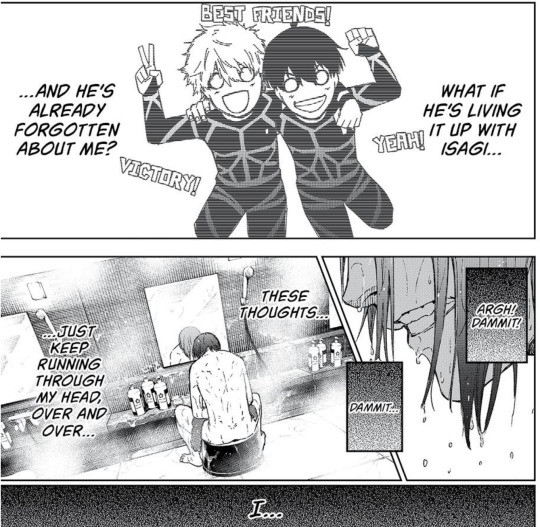

I saw some posts in the fandom reddit asking why Reo is acting like this. One in particular reads: "I get that he is betrayed and stuff but he is acting like it’s the end of the world, is it explained later why he acts like this? Is it because he doesn’t think he can win without Nagi?" Not to call this person out, I just want to answer the question in this post-
It has nothing to do with winning; it was never about winning. It was always about Nagi.
If we're looking at Reo through the borderline lens, it IS the end of the world for him. Nagi was his world. What's worse, he's fully aware that he's not acting rationally and he doesn't know why, which is making him feel ashamed and weak and embarrassed. Now I know why he's acting like this, but there are no Blue Lock psychiatrists sitting around to wack him with the mood stabilizers or the DBT handbook, so he's gonna stay feeling like a monster.
He lets these thoughts, along with the resentment and anger from being abandoned in the first place, fuel him for the second selection match. As he's watching the game play out, as Nagi is about to score the winning goal, Reo's mind starts racing with intrusive, negative thoughts.
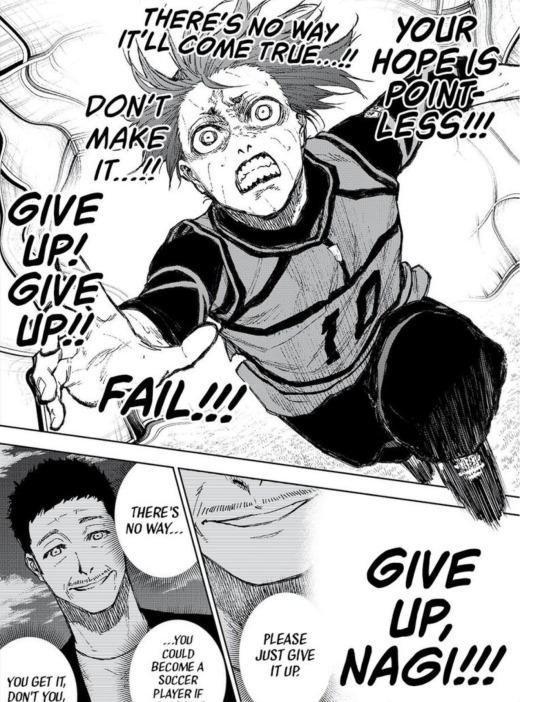
He's praying that Nagi fails, that he gives up, that he stops trying, anything to stop that solidifying moment where he scores the winning goal and proves once and for all that not only was Reo not strong enough to stop him, but Nagi doesn't need him anymore. He catches himself really quickly, because he realizes he's sounding just like his parents. Everything is spinning out of control so bad, Reo wants Nagi to end up in a vulnerable position so that he isn't the only one falling apart. As he catches himself thinking this, he's disgusted with himself. He calls himself 'utter trash', and as he watches Nagi score the winning goal, he falls to his knees, wishing he was dead.

As he sits there decomposing in emotional turmoil and suicidal ideation, Nagi's team chooses Chigiri to join them, and it's the nail in the coffin. This is probably Reo's lowest point in the entire story IMO. Nagi comes up to compliment him on his plays and Reo shows us another classic borderline move: he's anticipating how bad it's going to hurt to be abandoned by Nagi again, so he's trying to push him away before it can happen. We see the dichotomy of his spoken words and inner thoughts here, where he's talking big game to Nagi, saying things like 'you clearly don't care about me anymore, you're throwing me away, if you're going to abandon me just do it properly', while internally he's thinking 'I'm the worst, I wish I was dead, please take this bait and break my heart so that I can self destruct in peace'.
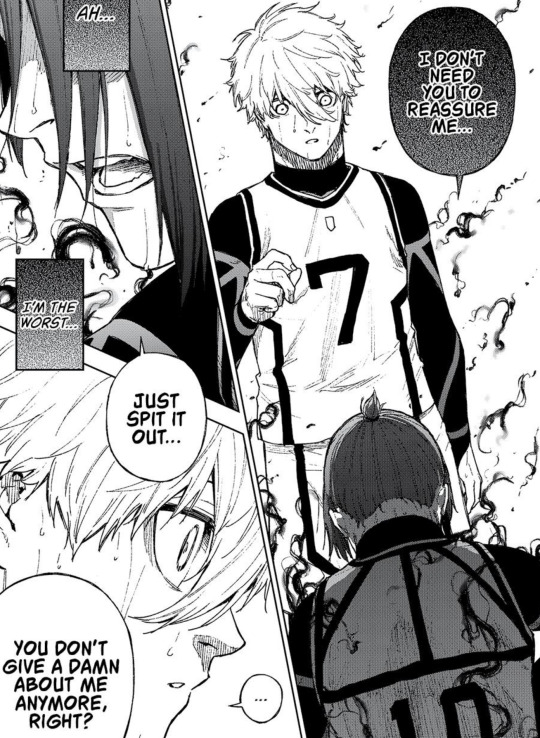
i LOVE the visuals during this moment. This is what Reo thinks is his last line of defense, the last thing he can do to preserve any part of his dignity is to make Nagi hate him so that he'll stop throwing these crumbs of affection at him. It's also really telling that despite his switch in behavior and the devaluing of Nagi, the root of all of that is STILL that he was so hurt by the abandonment.

I don't think I need to analyze the suicidal ideation because he just straight up says he wants to die like three times in this scene but, aside from that, the visual of his inner thoughts vs what he's actually saying is so powerful. Not to mention the chameleon imagery which i'll geek out about in a second, this is another example of his black and white thinking along with the reiteration that being abandoned was literally traumatic for Reo: he says they can never go back to what they were before. Speaking as a borderline, this is painfully true. When people break my trust even in a small way, I can never view them the same as I used to. I can forgive them and let it go, but I'll never be as open with them as I once was. In Reo's shoes, he had Nagi up on this pedestal that he was perfect and would never do anything to hurt him, but he did hurt him (in the worst way possible).

After Nagi tells him he's a pain in the ass and that he doesn't care anymore, Reo thanks him for 'finishing him off'. In his mind, they're done now and he can suffer in peace and quiet without dragging Nagi down anymore.
Bonus Point: The Chameleon Effect
I LOVE THE FACT THAT HIS THING IS CHAMELEONS AHHHH
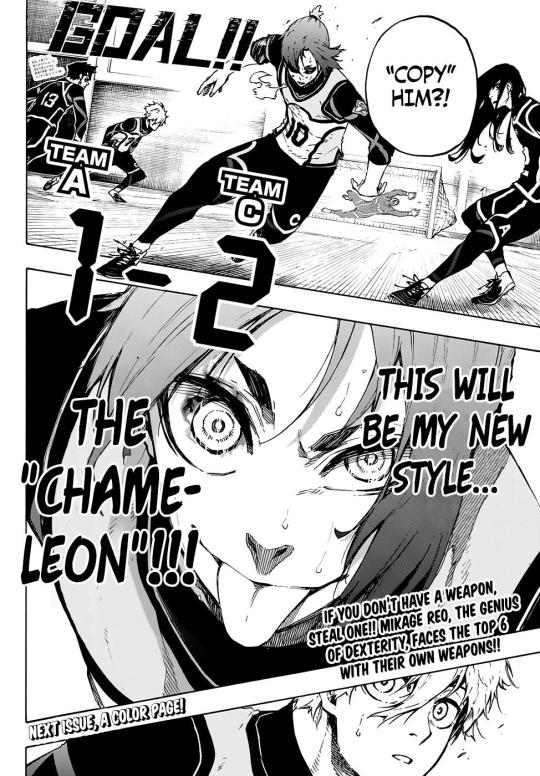
The chameleon imagery with Reo makes me INSANE dude. As I mentioned towards the beginning of this post, a part of borderline that is seldom talked about is the tendency to take on 'the chameleon effect', or mirror the people around them. REO'S ENTIRE THING IS CHAMELEONS LIKE BFFR ?? That image where he was trying to get Nagi to hate him, was before he even started using his chameleon style, it was just something the authors thought was necessary to include during Reo's mental breakdown. Aside from the cool imagery, his chameleon style is a reflection of his relationship with Nagi. He gets called a jack of all trades and a master of none early on in reference to how when he’s without Nagi, hes not really exceptional at anything. He never really took the time to master one specific thing because he was always so concerned with helping Nagi. This rings my BPD bell for a couple reasons: first of all, when you have no sense of identity and you’re worried it means you have no real personality ?? Steal one!! Take the closest person to you and copy that one. That’s something us baddies know VERY well. Also, think there’s something about you that your fp doesn’t like? Change it! You can morph into anything they want as long as it means they won’t leave you !! :*) Before he makes up with Nagi, he copies moves in hopes that it'll make him stronger and appear more desirable to Nagi. After they make up, he copies whoever he has to so that he can get Nagi to that goal and make himself useful, make himself somebody that Nagi wants to have around. It is a literal direct metaphor for him changing anything and everything about himself for Nagi and graaaahhhh it’s so cool
Reonagi ?? Some thoughts-
I want to close this yap session with my thoughts on Reonagi as a ship. I do think that they can work and I want to make that clear. I'm not on board with the 'borderlines arent capable of having loving and fulfilling relationships' crap. That being said, they both have to put in a bit of effort. Reo has already recognized a lot of his own issues. He admits that he was wrong for pushing his ideals onto Nagi, that he needs to let Nagi grow and be his own person, etc. Nagi really hasn't accepted any fault. I stand by the fact that Nagi needs to be more sensitive with Reo. Way too often when a relationship like this fails, all the blame is put on the one with borderline. I'm gonna be the outlier here and say that if Nagi cares about Reo, he needs to learn about Reo's triggers and be mindful of them. I'm not saying that since Reo is sensitive to abandonment that Nagi should just isolate himself from everybody else, but what I am saying is that when he's going to do something that doesn't involve Reo, he needs to learn how to communicate that he still loves and values Reo. "I'm gonna go play soccer with this person right now, but I haven't forgotten about our promise. When I come back, we can play together. I still love you and I'm not going to leave you for whoever tf I'm playing with rn." (sneaking that 'i love you' in bc like..they're literally canon at this point asdfghjkll) But, I do think that Nagi loves Reo and cares about him in his own way. The two of them just have to keep working on their communication skills. Nagi has the potential to have a hot rich husband who will literally bend over backward for him and buy him all the robux he could ever want, he's gotta put in a shred of effort!
I also like to think that Nagi didn’t totally get the fact that Reo doesn’t gaf about just playing soccer. Nagi thinks soccer is what they do together, it’s what makes reo happy, right? He’s always pushing him to train harder and take the game more seriously because he likes the sport, RIGHT? It would make perfect sense to go play with isagi so that he can get better at soccer and come back to reo a more improved player. Maybe that’s why he was surprised when Reo was so mad in the bathhouse, bc he wasn’t making the connection that Reo cares more about him than soccer. That Reo puts all that energy into him playing soccer because he thinks it’s something that they can have as their own, and once Nagi notices how good he is, he’ll start enjoying it and the two of them can hold hands and run around the soccer pitch!! I think Nagi missed that part tbh, and I don’t think he know that even now in the story. Maybe Reo doesn’t even notice it.
Anyway, a shameless plug to my reonagi playlist if that's your thing (i cooked with this one, i fear) https://open.spotify.com/playlist/5CsvSqmuI4cxOl1nTaV4GJ?si=737a0f21e0bd482a
Closing Thoughts:
Reo is a bpd baddie and I love him very much. I think he's a sensitive guy with a lot of feelings who would benefit from taking time to work through his trauma and his emotions. I hope that he eventually is able to build an identity for himself that doesn't involve Nagi, but baby steps, I suppose. I think Reo is a great balance of positive and negative borderline traits and he reads as a really believable and sympathetic character. He is, however, definitely that friend that you have to slap to stop them from running back to their ex.
Jokes aside though, BPD can be extremely hard to live with, even more so when it's undiagnosed and untreated. If someone you love has BPD, take the time to read up on it and do your best to understand them. I promise you, it will mean the world to them.
If you managed to get this far, thank you for reading! This was a messy stream of consciousness and I appreciate your support by listening.
432 notes
·
View notes
Text
Some Poetry Writing Tips
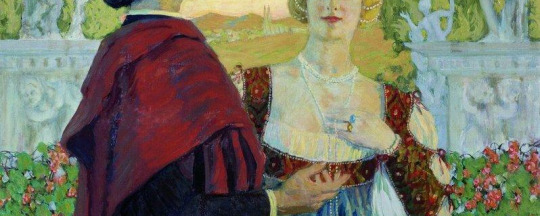
Rules for Writing Good Poetry
There are no officially sanctioned rules of poetry.
However, as with all creative writing, having some degree of structure can help you reign in your ideas and work productively.
Some guidelines for those looking to take their poetry writing to the next level.
Or, if you literally haven’t written a single poem since high school, you can think of this as a beginner's guide on the basics and have you writing poetry in no time:
Read a lot of poetry. If you want to write poetry, start by reading poetry. You can do this in a casual way by letting the words of your favorite poems wash over you without necessarily digging for deeper meaning. Or you can delve into analysis. Dissect an allegory in a Robert Frost verse. Ponder the underlying meaning of an Edward Hirsch poem. Retrieving the symbolism in Emily Dickinson’s work. Do a line-by-line analysis of a William Shakespeare sonnet. Simply let the individual words of a Walt Whitman elegy flow with emotion.
Listen to live poetry recitations. The experience of consuming poetry does not have to be an academic exercise in cataloging poetic devices like alliteration and metonymy. It can be musical—such as when you attend a poetry slam for the first time and hear the snappy consonants of a poem out loud. Many bookstores and coffeehouses have poetry readings, and these can be both fun and instructive for aspiring poets. By listening to the sounds of good poetry, you discover the beauty of its construction—the mix of stressed syllables and unstressed syllables, alliteration and assonance, a well placed internal rhyme, clever line breaks, and more. You’ll never think of the artform the same way once you hear good poems read aloud. (And if you ever get the chance to hear your own poem read aloud by someone else, seize the opportunity.)
Start small. A short poem like a haiku or a simple rhyming poem might be more attainable than diving into a narrative epic. A simple rhyming poem can be a non-intimidating entryway to poetry writing. Don’t mistake quantity for quality; a pristine seven-line free verse poem is more impressive than a sloppy, rambling epic of blank verse iambic pentameter, even though it probably took far less time to compose.
Don’t obsess over your first line. If you don’t feel you have exactly the right words to open your poem, don’t give up there. Keep writing and come back to the first line when you’re ready. The opening line is just one component of an overall piece of art. Don’t give it more outsized importance than it needs (which is a common mistake among first time poets).
Embrace tools. If a thesaurus or a rhyming dictionary will help you complete a poem, use it. You’d be surprised how many professional writers also make use of these tools. Just be sure you understand the true meaning of the words you insert into your poem. Some synonyms listed in a thesaurus will deviate from the meaning you wish to convey.
Enhance the poetic form with literary devices. Like any form of writing, poetry is enhanced by literary devices. Develop your poetry writing skills by inserting metaphor, allegory, synecdoche, metonymy, imagery, and other literary devices into your poems. This can be relatively easy in an unrhymed form like free verse and more challenging in poetic forms that have strict rules about meter and rhyme scheme.
Try telling a story with your poem. Many of the ideas you might express in a novel, a short story, or an essay can come out in a poem. A narrative poem like “The Waste Land” by T.S. Eliot can be as long as a novella. “The Raven” by Edgar Allan Poe expresses just as much dread and menace as some horror movies. As with all forms of English language writing, communication is the name of the game in poetry, so if you want to tell short stories in your poems, embrace that instinct.
Express big ideas. A lyric poem like “Banish Air from Air” by Emily Dickinson can express some of the same philosophical and political concepts you might articulate in an essay. Because good poetry is about precision of language, you can express a whole philosophy in very few words if you choose them carefully. Even seemingly light poetic forms like nursery rhymes or a silly rhyming limerick can communicate big, bold ideas. You just have to choose the right words.
Paint with words. When a poet paints with words, they use word choice to figuratively “paint” concrete images in a reader’s mind. In the field of visual art, painting pictures of course refers to the act of representing people, objects, and scenery for viewers to behold with their own eyes. In creative writing, painting pictures also refers to producing a vivid picture of people, objects, and scenes, but the artist’s medium is the written word.
Familiarize yourself with myriad forms of poetry. Each different form of poetry has its own requirements—rhyme scheme, number of lines, meter, subject matter, and more—that make them unique from other types of poems. Think of these structures as the poetic equivalent of the grammar rules that govern prose writing. Whether you’re writing a villanelle (a nineteen-line poem consisting of five tercets and a quatrain, with a highly specified internal rhyme scheme) or free verse poetry (which has no rules regarding length, meter, or rhyme scheme), it’s important to thrive within the boundaries of the type of poetry you’ve chosen. Even if you eventually compose all your work as one particular type of poem, versatility is still a valuable skill.
Connect with other poets. Poets connect with one another via poetry readings and perhaps poetry writing classes. Poets in an artistic community often read each other’s work, recite their own poems aloud, and provide feedback on first drafts. Good poetry can take many forms, and through a community, you may encounter different forms that vary from the type of poem you typically write—but are just as artistically inspiring. Seek out a poetry group where you can hear different types of poetry, discuss the artform, jot down new ideas, and learn from the work of your peers. A supportive community can help you brainstorm ideas, influence your state of mind as an artist, and share poetry exercises that may have helped other members of the group produce great poetry.
Source ⚜ More: Notes ⚜ References for Poets ⚜ Writing Resources PDFs
#poetry#writeblr#literature#writers on tumblr#writing tips#writing reference#dark academia#spilled ink#writing prompt#creative writing#poets on tumblr#writing a#writing inspiration#light academia#boris kustodiev#writing resources
114 notes
·
View notes
Text
Cross-posting an essay I wrote for my Patreon since the post is free and open to the public.

Hello everyone! I hope you're relaxing as best you can this holiday season. I recently went to see Miyazaki's latest Ghibli movie, The Boy and the Heron, and I had some thoughts about it. If you're into art historical allusions and gently cranky opinions, please enjoy. I've attached a downloadable PDF in the Patreon post if you'd prefer to read it that way. Apologies for the formatting of the endnotes! Patreon's text posting does not allow for superscripts, which means all my notations are in awkward parentheses. Please note that this writing contains some mild spoilers for The Boy and the Heron.

Hayao Miyazaki’s 2023 feature animated film The Boy and the Heron reads as an extended meditation on grief and legacy. The Master of a grand tower seeks a descendant to carry on his maddening duty, balancing toy blocks of magical stone upon which the entire fabric of his little pocket of reality rests. The world’s foundations are frail and fleeting, and can pass away into the cold void of space should he neglect to maintain this task. The Master’s desire to pass the torch undergirds much of the film’s narrative.

(Isle of the Dead. Arnold Böcklin. 1880. Oil on Canvas. Kunstmuseum. Basel, Switzerland.)
Arnold Böcklin, a Swiss Symbolist(1) painter, was born on October 16 in 1827, the same year the Swiss Evangelical Reformed Church bought a plot of land in Florence from the Grand Duke of Tuscany, Leopold II, that had long been used for the burials of Protestants around Florence. It is colloquially known as The English Cemetery, so called because it was the resting place of many Anglophones and Protestants around Tuscany, and Böcklin frequented this cemetery—his workshop was adjacent and his infant daughter Maria was buried there. In 1880, he drew inspiration from the cemetery, a lone plot of Protestant land among a sea of Catholic graveyards, and began to paint what would be the first of six images entitled Isle of the Dead. An oil on canvas piece, it depicts a moody little island mausoleum crowned with a gently swaying grove of cypresses, a type of tree common in European cemeteries and some of which are referred to as arborvitae. A figure on a boat, presumably Charon, ferries a soul toward the island and away from the viewer.

(Photo of The English Cemetery in Florence. Samuli Lintula. 2006.)
The Isle of the Dead paintings varied slightly from version to version, with figures and names added and removed to suit the needs of the time or the commissioner. The painting was glowingly referenced and remained fairly popular throughout the late 19th and early 20th centuries. The painting used to be inescapable in much of European popular culture. Professor Okulicz-Kozaryn, a philologist (someone with a deep interest in the ways language and cultural canons evolve)(2) observed that the painting, like many other works in its time, was itself iterative and became widely reiterated and referenced among its contemporaries. It became something like Romantic kitsch in the eyes of modern art critics, overwrought and excessively Byronic. I imagine Miyazaki might also resent a work of that level of manufactured ubiquity, as Miyazaki famously held Disney animated films in contempt (3). Miyazaki’s films are popularly aspirational to young animators and cartoonists, but gestures at imitation typically fall well short, often reducing Miyazaki’s weighty films to kitschy images of saccharine vibes and a lazy indulgence in a sort of empty magical domestic coziness. Being trapped in a realm of rote sentiment by an uncritical, unthoughtful viewership is its own Isle of Death.

(Still from The Boy and the Heron, 2023. Studio Ghibli.)
The Boy and the Heron follows a familiar narrative arc to many of Miyazaki’s other films: a child must journey through a magical and quietly menacing world in order to rescue their loved ones. This arc is an echo of Satsuki’s journey to find Mei in My Neighbor Totoro (1988) and Chihiro’s journey to rescue her parents Spirited Away (2001). To better understand Miyazaki’s fixation with this particular character journey, it can be instructive to watch Lev Atamanov’s 1957 animated film, The Snow Queen (4)(5), a beautifully realized take on Hans Christian Andersen’s 1844 children’s story (6)(7). Mahito’s journey continues in this tradition, as the boy travels into a painted world to rescue his new stepmother from a mysterious tower.
Throughout the film, Miyazaki visually references Isle of the Dead. Transported to a surreal world, Mahito initially awakens on a little green island with a gated mausoleum crowned with cypress trees. He is accosted by hungry pelicans before being rescued by a fisherwoman named Kiriko. After a day of catching and gutting fish, Mahito wakes up under the fisherwoman’s dining table, surrounded by kokeshi—little wooden dolls—in the shapes of the old women who run Mahito’s family’s rural household. Mahito is told they must not be touched, as the kokeshi are wards set up for his protection. There is a popular urban legend associated with the kokeshi wherein they act as stand-ins for victims of infanticide, though there seems to be very little available writing to support this legend. Still, it’s a neat little trick that Miyazaki pulls, placing a stray reference to a local legend of unverifiable provenance that persists in the popular imagination, like the effect of fairy stories passed on through oral retellings, continually remolded each new iteration.
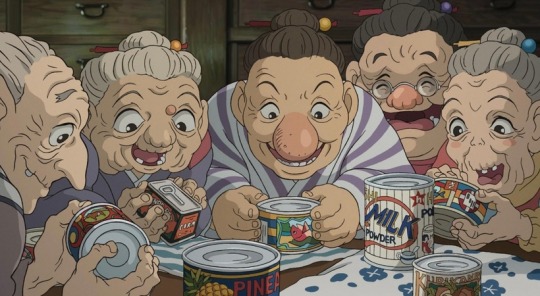
(Still from The Boy and the Heron, 2023. Studio Ghibli.)
Kiriko’s job in this strange landscape is to catch fish to nourish unborn spirits, the adorable floating warawara, before they can attempt to ascend on a journey into the world of the living. Their journey is thwarted by flocks of supernatural pelicans, who swarm the warawara and devour them. This seems to nod to the association of pelicans with death in mythologies around the world, especially in relationship to children (8). Miyazaki’s pelicans contemplate the passing of their generations as each successive generation seems to regress, their capacity to fulfill their roles steadily diminishing.
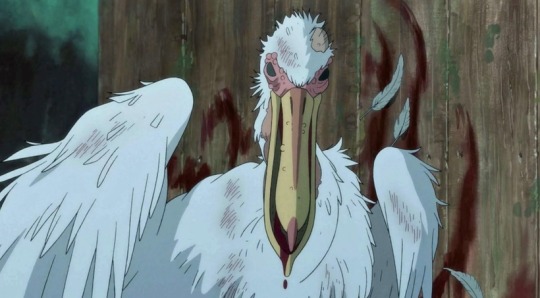
(Still from The Boy and the Heron, 2023. Studio Ghibli.)
As Mahito’s adventure continues, we find the landscapes changing away from Böcklin’s Isle of the Dead into more familiar Ghibli territories as we start to see spaces inspired by one of Studio Ghibli’s aesthetic mainstays, Naohisa Inoue and his explorations of the fantasy realms of Iblard. He might be most familiar to Ghibli enthusiasts as the background artists for the more fantastical elements of Whisper of the Heart (1995).

(Naohisa Inoue, for Iblard Jikan, 2007. Studio Ghibli.)
By the time we arrive at the climax of The Boy and the Heron, the fantasy island environment starts to resemble English takes on Italian gardens, the likes of which captivated illustrators and commercial artists of the early 20th century such as Maxfield Parrish. This appears to be a return to one of Böcklin’s later paintings, The Island of Life (1888), a somewhat tongue-in-cheek reaction to the overwhelming presence of Isle of the Dead in his life and career. The Island of Life depicts a little spot of land amid an ocean very like the one on which Isle of the Dead’s somber mausoleum is depicted, except this time the figures are lively and engaged with each other, the vegetation lush and colorful, replete with pink flowers and palm fronds.
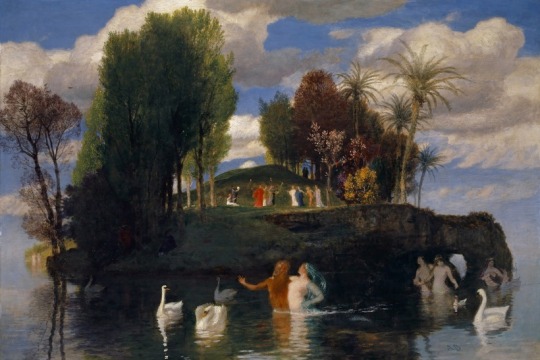
(Island of Life. Arnold Böcklin. Oil on canvas. 1888. Kunstmuseum. Basel, Switzerland.)
In 2022, Russia’s State Hermitage Museum in Saint Petersburg acquired the sixth and final Isle of the Dead painting. In the last year of his life, Arnold Böcklin would paint this image in collaboration with his son Carlo Böcklin, himself an artist and an architect. Arnold Böcklin spent three years painting the same image three times over at the site of his infant daughter’s grave, trapped on the Isle of the Dead. By the time of his death in 1901 at age 74, Böcklin would be survived by only five of his fourteen children. That the final Isle of the Dead painting would be a collaboration between father and son seemed a little ironic considering Hayao Miyazaki’s reticence in passing on his own legacy. Like the old Master in The Boy and the Heron, Miyazaki finds himself with no true successors.
The Master of the Tower's beautiful islands of painted glass fade into nothing as Mahito, his only worthy descendant, departs to live his own life, fulfilling the thesis of Genzaburo Yoshino’s 1937 book How Do You Live?, published three years after Carlo Böcklin’s death. In evoking Yoshino and Böcklin’s works, Hayao Miyazaki’s The Boy and the Heron suggests that, like his character the Master, Miyazaki himself must make peace with the notion that he has no heirs to his legacy, and that those whom he wished to follow in his footsteps might be best served by finding their own paths.
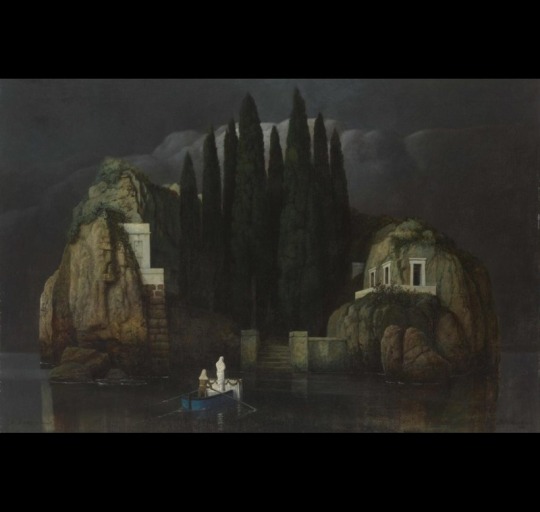
(Isle of the Dead. Arnold and Carlo Böcklin. Oil on canvas. 1901. The State Hermitage Museum. Saint Petersburg, Russia.)
INFORMAL ENDNOTES
1 - Symbolists are sort of tough to nail down. They were started as a literary movement to 1 distinguish themselves from the Decadents, but their manifesto was so vague that critics and academics fight about it to this day. The long and the short of it is that the Symbolists made generous use of a lot of metaphorical imagery in their work. They borrow a lot of icons from antiquity, echo the moody aesthetics from the Romantics, maintained an emphasis on figurative imagery more so than the Surrealists, and were only slightly more technically married to the trappings of traditionalist academic painters than Modernists and Impressionists. They're extremely vibes-forward.
2 - Okulicz-Kozaryn, Radosław. Predilection of Modernism for Variations. Ciulionis' Serenity among Different Developments of the Theme of Toteninsel. ACTA Academiae Artium Vilnensis 59. 2010. The article is incredibly cranky and very funny to read in parts. Contains a lot of observations I found to be helpful in placing Isle of the Dead within its context.
3 - "From my perspective, even if they are lightweight in nature, the more popular and common films still must be filled with a purity of emotion. There are few barriers to entry into these films-they will invite anyone in but the barriers to exit must be high and purifying. Films must also not be produced out of idle nervousness or boredom, or be used to recognise, emphasise, or amplify vulgarity. And in that context, I must say that I hate Disney's works. The barrier to both the entry and exit of Disney films is too low and too wide. To me, they show nothing but contempt for the audience." from Miyazaki's own writing in his collection of essays, Starting Point, published in 2014 from VIZ Media.
4 - You can watch the movie here in its original Russian with English closed captions here.
5 If you want to learn more about the making of Atamanoy's The Snow Queen, Animation Obsessive wrote a neat little article about it. It's a good overview, though I have to gently disagree with some of its conclusions about the irony of Miyazaki hating Disney and loving Snow Queen, which draws inspiration from Bambi. Feature film animation as we know it hadonly been around a few decades by 1957, and I find it specious, particularly as a comic artistand author, to see someone conflating an entire form with the character of its content, especially in the relative infancy of the form. But that's just one hot take. The rest of the essay is lovely.
6 - Miyazaki loves this movie. He blurbed it in a Japanese re-release of it in 2007.
7 - Julia Alekseyeva interprets Princess Mononoke as an iteration of Atamanov's The Snow Queen, arguing that San, the wolf princess, is Miyazaki's homage to Atamanoy's little robber girl character.
8 - Hart, George. The Routledge Dictionary of Egyptian Gods And Goddesses. Routledge Dictionaries. Abingdon, United Kingdom: Routledge. 2005.
#hayao miyazaki#the boy and the heron#how do you live#arnold böcklin#carlo böcklin#symbolists#symbolism#animation#the snow queen#lev atamanov#naohisa inoue#the endnotes are very very informal aksjlsksakjd#sorry to actual essayists
527 notes
·
View notes
Text
Finding Fascism in My Hero Academia (1/4)
Being a 4-part project to compare the Meta-Liberation Army, the Heroes, and the meta-narrative messaging of My Hero Academia to Umberto Eco's evergreen Ur-Fascism and its 14-point list of beliefs, ideologies, and cultural hang-ups that can serve as flashpoints for fascism.
This was inspired by ongoing aggravation with the crappy rhetoric used to talk about the MLA, especially in Twitter circles. I had already been thinking about writing this piece anyway, but some ragebait brought to my Tumblr inbox together with the massive letdown of the canon ending pushed me over the edge into what eventually ballooned into several months of work and thirty thousand words about how My Hero Academia makes some expressions of fascism really easy to spot while hiding others behind a double-thick wall of double-standards.
Read some excerpts below! Or read the first part on my Patreon, no membership required.
-------
Are the MLA fascist? How fascist exactly, and in what ways? More to the point, are they noticeably more fascist than the broader society in which they exist—the society Heroes fight to uphold!—with its indefinite torture prisons and its laws restricting bodily autonomy and its rampant discrimination against multiple different demographics of people?
To answer those questions, first we have to define our term: what is fascism, anyway?
The trick to that question is that “fascism” is infamously squirrely and difficult to pin down to a single, all-encompassing yet concise definition. Wikipedia has a dedicated page solely for definitions of fascism, entirely separate from the page for fascism itself. It contains a wide sampling of definitions offered by reference books, scholars, Marxists, Fascists themselves, and a number of others. At the bottom of the page is a subsection labeled “Fascism as an insult,” in which can be found the following quote from a writing by George Orwell in 1944:
“The word ‘Fascism’ is almost entirely meaningless. In conversation, of course, it is used even more wildly than in print. I have heard it applied to farmers, shopkeepers, Social Credit, corporal punishment, fox-hunting, bull-fighting, the 1922 Committee, the 1941 Committee, Kipling, Gandhi, Chaiang Kai-Shek, homosexuality, Priestly's broadcasts, Youth Hostels, astrology, women, dogs and I do not know what else... Except for the relatively small number of Fascist sympathizers, almost any English person would accept ‘bully’ as a synonym for ‘Fascist.’ That is about as near to a definition as this much-abused word has come.”
It would be entirely possible for me to find definitions of fascism that would let me say, “No, the MLA aren’t fascist at all.” For example, over half of the definitions on the Wikipedia page mention some variation of nationalism explicitly: ultranationalism, militaristic nationalism, revolutionary nationalism, hypernationalism, or a more expansively worded version of “subordinating the individual to the State.” If you exclude the definitions offered by Marxist sources, who have a pretty different paradigm around fascism, that count jumps up to three-quarters! So if we’re operating under definitions used by people who have actually put in some thought and research, the MLA can’t even pass one of the most common, basic criteria: they are in no sense of the word nationalist.
Case closed! People on the internet need to learn what words mean, The End.
…But let’s go back to Orwell for a second. He also said that, while the definitions can be fuzzy, people generally know what they mean when they throw the label around. So, what do people generally mean?
I think the definition that most gets at that is a 14-point list that I’ve seen circulating around Tumblr for years, and has recently started to come up more frequently on my radar given the state of politics in the U.S. The list is part of an essay called Ur-Fascism written by one Umberto Eco in 1995. Eco grew up in Fascist Italy and researched fascism as an ideology extensively as an adult; his tack was to approach the roots of the ideology, identifying a number of commonalities that one could view as symptoms of or warning signs for the rise of fascism in a group—hence the essay’s alternate title of Eternal Fascism. Not every state or government described as fascist would possess all of these traits, but even a single one being present in a group could potentially serve as a point that fascism could coalesce around.
I have seen Ur-Fascism described as uselessly vague or overly broad, but the point is that it isn’t a definition of fascism itself, but a description of the kinds of mentality or circumstances that can give rise to fascist ideology. Given that I know for a fact Eco’s checklist does the rounds on Tumblr and thus may inform the understanding of any number of fans who are using the fascist label more colloquially than with an eye to strict accuracy, and also given that the MLA succinctly fails to meet a primary criterion for fascism proper, I want to look at them instead through the Ur-Fascism lens.
…Not just them, though! My whole spite-fueled goal with this project is to compare the MLA to the protagonist Heroes and the status quo they defend. In the writing process, this has stabilized into three relatively distinct considerations: both the Meta Liberation Army and Team Hero as presented within the story and, further, the meta-narrative of My Hero Academia itself.
---(...)---
Point 1: The cult of tradition.
Looking to the thinkers of the ancient past for wisdom, believing that there can be no (worthwhile) new knowledge/advancement because the “ancients” already knew everything of worth. Look particularly for historically discrete belief systems being falsely syncretized, the internal contradictions of the resulting fusion being ignored or massaged away in service to the desired narrative.
MLA: No. Their whole thing is looking towards the future of quirks and people “becoming who they were meant to be.” The only thing they’ve got going on in terms of past-worship is their veneration of Destro and his bloodline, but that feels less like believing in the supremacy of the old than it does just the supremacy of one particular martyr. They don’t worship him out of a sense of “older = superior”; they worship him because he had a view of the future that he was prevented from carrying out, and they’ve been taught to share that view of the future. They aren’t trying to return to an idealized past, and certainly not a syncretistic one, though they do become a syncretized organization with the League merger. This, however, is a practical matter of current alliances, rather than the more characteristic Ur-Fascist attempt to flatten the beliefs of discrete groups in the past to better play up their supposed superior wisdom.
---(...)---
Point 2: Rejection of modernism.
Rejection of the modern way of life, particularly the shifts that came of the Enlightenment, the Age of Reason, modern history revolutions (as in France and the U.S.), frequently capitalism, etc. The modern age is viewed as one of moral collapse leading to depravity. In the modern U.S. for example, we see the alt-right trying to roll back the social upheavals of the civil rights era; my readers may also consider, if they’re familiar with the phenomenon, Rome Bros on Twitter. In Japan, this has tended to manifest as veneration of the Emperor as divine and a desire to purge Japan of Western influence.
Team Hero: Human advancement at large is explicitly described as grinding to a halt during the Advent of the Extraordinary. All technological development, all culture, now seems to rotate solely around Heroes and how best to support them. However dire that state of affairs is, however, it’s not a result of Heroes/the current regime specifically rejecting advancement or modern schools of thought. I will come back to this, however; it very much fits the bill for a later point.
---(...)---
Point 3: Action for action’s sake.
“Action being beautiful in itself, it must be taken before, or without, any previous reflection. Thinking is a form of emasculation.” Reflects in a disdain for intellectuals/academics. Like the following point, this ethic exists at least in part because the cultural syncretism of Point 1 can’t withstand critical analysis.
Meta-Narrative: See all of the Hero analysis and kick it up a notch. The “act without thinking” mentality as a marker for Heroism is never seriously critiqued, examined, or undermined. It’s a plague in the Shonen Jump brand, I think, that “intellectual” characters can be good guys, sure, even in the main character’s nakama, but the protagonists are classically shounen hot-heads, with that hot-headedness being portrayed over and over again as more genuine, and therefore more admirable, than cool-headed intellect, which tends to get portrayed as compensating (unsuccessfully) for a lack of strength or faith at best, and evil manipulative cunning at worst. While Heroes as a collective may not believe in action for action’s sake in-universe, the fact that the characters who do uphold it as a value are the main characters becomes much more reflective of the meta-narrative ethos.
Indeed, it’s quite glaring to me that, while the planning for the raids is a great counterexample to “action for action’s sake” within the story, none of the kids the audience views as the main characters and promised symbols of a better and brighter future are allowed to take part in those plans. Rather, the kids merely act as they’re directed, without reflecting on whether the orders they’re given are good orders, much less whether those orders will actually lead to the aforementioned brighter future. The kids who were once willing to directly disobey the orders of adults have long, long vanished from the story by its end.
Read the rest here!
#bnha#bnha critical#meta liberation army#this particular section is a bit mla apologetics but I promise it does not last#bnha analysis#bnha meta#finding fascism bnha
98 notes
·
View notes
Note
hello! If this question is too personal, please feel free to ignore. I’m writing an informative essay on the Palestinian experience under occupation (college English final) and I just wanted to ask this.
As children in Palestine (or outside of Palestine, but born to Palestinian parents), are you raised with the knowledge of the hatred and disdain of the Israelis towards the Palestinians or would you say that Palestinian parents “shelter” (for lack of a better word that I can think of) or attempt to “shelter” their children from the pain of the Israeli’s hatred? I would assume that protecting the emotions and minds of the children would be somewhat impossible to do, but I would appreciate if you could provide some insight into this and also how children deal with the mental toll of being under occupation or knowing that their people are not free. My apologies if this is question is insensitive, please feel free to ignore and delete this if you feel uncomfortable. Thank you!
we, as palestinians, are raised with the complete knowledge that zionists hate us. there is no "hiding" that fact. when you live under an occupation, you know it. you feel the effects of it. you see it every day. one of the very first things i've been raised to learn is that i am a person who majority of the world hates. and you genuinely cannot hide that. even though we were, and are, children, we have to face the truth immediately. we are an oppressed people. our parents do not hide this from us. it would be cruel if they did. we deserve to know that there is a better life for us than this, and we deserve to know what is happening against us. you cannot hide the effects of oppression and occupation. we will learn about it whether someone tells us or not.
because of this, palestinians raise their children to be extremely educated. palestinians are some of the most highly educated people in the world. we become educated when we're young and continue to become more and more educated as we grow because that is what we believe will set us free. the newer generations must have knowledge to fight back. the children are the future, as we all know. the sooner we are educated, the sooner we can start fighting back against oppression. that is why we urge other people to become educated, so they can help us fight against oppression as well. oppression cannot be hidden from us. we must learn to notice it wherever we go, in order to end it. that is why palestinians do not hide away their children. of course, we love our children and we try to ease the pain for them as much as possible, but the pain is our real life. our suffering is part of our fight, our identity. and we are fighting for a day where our suffering will never have to be permanent part of our identity again. we want to protect our children, but we cannot protect them against a world that wants them dead. we cannot do it alone, so we need people to step up and stand with us, in order to raise our children without them having to know the suffering we've endured.
being a child living under the occupation is difficult. you make friends one year, you lose them the next year. you finally manage to get out of palestine, and suddenly you're never allowed to go back in. you see posters on the wall of every city, full of faces of the people who were martyred by the hands of the oppressors and you pray to god that your face isn't going to be on there next. you are constantly surrounded by death and suffering. palestine is beautiful. our culture is beautiful. we constantly try to appreciate our beauty. but we cannot just do that without also facing the reality. we are an oppressed people. we know this. we see this. we feel this.
being a child living in the diaspora is also difficult. seeing how everyone around you can go on with their day, all smiles and laughs, not knowing your family in palestine were just killed the other day. seeing the media twist the narrative and make up lies about you and your people. being wary of everyone around you because you're not sure if they're a zionist or not so you have to hide your identity and who you are. watching as your people are massacred on tv while you're sitting there in your living room from a continent away, shaking with fear because "what if that was me?"
we know zionists hate us. this is the first thing we learn. we cannot hide our children from this truth, because that would only harm them more than it would protect them.
673 notes
·
View notes
Text






Wood Engraving Wednesday
GERI WADDINGTON
These wood engravings are by English artist Geri Waddington (b. 1953), and are inserted into her brief essay about her visit to "French Papermakers & Other House Guests," published in Matrix 29 (Summer 2010), pp. 14-16, printed at John and Rosalind Randle’s Whittington Press in Risbury, Herefordshire, England in an edition of 725 copies.
Waddington describes her visits to Moulin du Verger, in Puymoyen, France, operated by proprietor and master papermaker Jacques Brejoux, Moulin de la Rouzique (now a museum) in Périgord, and the Moulin de Larroque in Couze-Saint-Front. Much of her narrative, however, dwells on the house she stayed at which had many other non-human residents, including doves and bats that live in "pigeoneer" holes and lizards that live in the walls, as reflected in these engravings. Other denizens included frogs, toads, hornets, masonry bees, and a barn owl. Waddington writes:
I am not sure if my blocks or my printing can do justice to these beautiful papers, but perhaps it is enough just to own some of these little pieces of history, mementos of a continuum of craftsmanship stretching back nearly five hundred years.
Geri Waddington trained in painting at the Slade School of Fine Art and started engraving in 1995. In 2001 she was elected a member of the venerable Society of Wood Engravers, and served as its chair in 2014.
View more posts with work by Geri Waddington.
View more posts with wood engravings!
#Wood Engraving Wednesday#wood engravings#wood engravers#women wood engravers#Geri Waddington#French Papermakers & Other House Guests#Matrix#Matrix 29#John and Rosalind Randle#Whittington Press#lizards#doves#handmade paper
108 notes
·
View notes
Text
Three Cheers for sweet revenge plot song by song according to me
My credentials are that uhmm ive listened to this album like weekly since i was like 12 and uhm im taking english A-Level (crime and tragedy) sooooo
Full disclaimer i could do a line by line analysis on pretty much all of these songs but then this would be stupidly long so im just touching on the points or lyrics i think are most important for the plot! Oh and i cant spell and im trieddd of writing academic essays so im kinda yapping ngl
HELENA
honestly i barely have anything to say here but i imagine its the demo woman’s funeral (yes ik its abt Gerard ways grandma but let me cook) kind of setting the tone and exploring his grief, creating the circumstances for his deal with the devil - especially in the bridge.
GIVE EM HELL KID
Ok so here!! Is where i start to have more to say!! So in my head the man (im just gonna call them tje man and the woman or like he/she from here on) has accepted the deal with satan to kill 1000 evil men and is basically on a killing spree? So from my immense medical knowledge of watching house im preity sure epidrene is a steroid, which like gives him energy (interestingly ive been on them a few times for asthma and they have a long list of mental side effects such as uhhh mania (fall out boy whooo) anxiety and depression which maybe foreshadows his sorta insanity towards the end as his guilt haunts him) acting as a symbol of his immense motivation to see his wife again, so verse one especially is before his downfall where hes like yippee killing people to see my wife again!! The chorus i imagine is sang by both him and the woman in heaven as they both long for each other uhm and later on in the song it does seem as if hes begining to kind of loose it a bit due to his grief? kind of foreshadowing his well everything later on in the album. In the bridge i imagine hes kind of mocking their teenage selves (linking to im not okay later on) especially in the line “we are young and we dont care” criticicing their hopefullness by comparing it to their current circumstance - ironic as it only gets worse from here.
TO THE END
Now i know this is based on a rose for emily (i tried to read it and there were a LOT of slurs from what i remeber so that was yeah) but for the sake of my silly little narrative were kinda just not gonna touch on that. So here i believe the man has been set to kill this couple, just to find the wife has killed her husband (with the “cyanide you drank” i assume) which drives him into a sort of crisis, questioning if this was what would have happened to him and his wife if she had lived and they had stayed married for this long (fueling his sexuality crisis in prison). I could go so much further into this, especially language wise but for the sake of everyones sanity ill leave it here :)
YOU KNOW WHAT THEY DO TO GUYS LIKE US IN PRISION
so hes literally in the middle of a gunfight in the centre of a resturant and the police come and theyre like come with ur arms raised high and ok so!!! Theres many people who could explain this better than me but the man gets arrested for killing all these people and gets sent to jailllll. Ive heard some people talk about it as an allegory for SA in prison and others who talk abt it as him realising his gay/bi ect and honestly i can see both. I really like the line “too much to late or just not enough of this, pain in my heart for your dying wish, i kiss your lips again!” Which, running with the latter intrepretation, suggests hes feeling regret for all the murdering hes done and is questioning if he ever did love his wife this much, and if he should move on and fix his mistakes. So to make a long story short he has a sexuality crisis in prision! Toward the end, he escapes prision and with his “friends” from jail, lilely from setting it on “fire” (i got the friends bit from the lyric “but ill go down with my friends”) escaping jail but at the cost of further loosing his sanity and grasp on morality.
IM NOT OKAY (I PROMISE)
for conveniences sake he either gets knocked out (the giggles at the end of prision i guess beinf from a concussion or something?) or just like goes to sleep somehwhere after the prison break with the other ex inmates and has a flashback to his time in high school, when he fell in love with his wife. As an audienve were kinds like dude she did not like you back then calm down which makes us question the morality of his mission, but for him it reminds him of what hes fighting for and erases the doubt he had in their love in to the end and prison. I will say im kinda pidgenholing this in with the flashback but uhm yeah!
THE GHOST OF YOU
This song acts as a continuation of his grief, back in the present day after im not okay made him remember what he was doing this all for. This basically confirms his belief that killing all these people is right because he needs to see her again. He battles with his morality knowing that she should be “never coming home” cause shes dead but then considering the deal with satan and its morality asking himself “could i? Should i?”. Towards the end, it seems like he decides killing the men to bring her back is the right thing to do. the line “If i fall, down” seems to show his commitment to her regardless of morality, hes willing to ‘fall down’ to hell if it means he gets more time with her which is ironic as he later does go to hell, but never gets to see her again.
THE JETSET LIFE IS GONNA KILL YOU
and hes back to killing again!! I think “her killing jar” is a metaphor for his fixation on his wife and the things its driving him to do. Hes trapped as if he was in a jar by the deal he made with satan for her. Its kind of difficult to explain but essentially hes assuring himself that hes doing it all for her and its all worth it as his sanity slowly dissipates, which i believe is demonstrated through the lyric “pull the plug” kinda symbolising hes giving up on himself and dedicating everything to her. Now this is obviously unhealthily obsessive and is the point where we definately start to question if what hes doing is right - is he not essentially playing god now? Should one man act as judge, jury and executioner?
INTERLUDE
ok its literally just the interlude but here i beleive he is praying for god, the “saints”, to “protect” his wife in heaven further showing his like motive? For all of his murders - his love for her however dangerously codependant.
THANK YOU FOR THE VENOM
HE KILLS MORE PEOPLE 🔥🔥 its almost like he has to kill 1000 evil men damn. BUT now hes starting to loose his grip on reality and is killing innocent people. I like to think he goes to the church he married his wife in and starts killing people - hence the line “sister im not much a poet but a criminal” - hes changed completely from the man he once was. They try to convince him to like stop saying its not what his wife would have wanted but he does not listen - in the lyric “preach all you want but whos gonna save me” - and continues to spiral into a life of crime and implied addiction (when in the chorus he says “give me all your posion and give me all your pills”)
HANG EM HIGH
THIS!! This is the one i can never fully figure out despite it being so good 🙏🙏 it feels like a cop out to say he suddenly becomes a cowboy or idk has to kill a cowboy but any other way i can interpret it is just the same old back to mourning his wife and dedicating his life to her so uhm yeah take any of those 3 or your own and run with it (please tell me if you know how to make this fit better than me)
ITS NOT A FASHION STATEMENT ITS A FUCKING DEATHWISH
Hes now so deep into his mission he cant quit despite the regret he feels. This kind of links back to his mocking of their younger selves in give em hell through the lyric “do you remeber back there when we met you told me this gets harder, well it did!”. Hes kind of pondering how his life got this bad wishing it didnt have to be this way. however he believes they will soon be reunited - evidenced through lines such as “im coming back from the dead” and the repeated references to resserection and him finding his wife, “your running out of places, to hide from me”. At the end, he says “i lost my fear of falling, i will be with you”, further showing he thinks he will soon see his wife again and simmilarly to the ghost of you shows hes willing to sacrafice his soul just to see her again
CEMETERY DRIVE
trust me the fake music video in my head for this goes HARD. So he visits the cemetary where his wife is buried to kinda tell her in a way? That hes almost finished and he’ll see her soon. And in my like the cool cinemetic imaganary music video he dances with her ghost but uhm plot wise hes kinda lamenting how much he misses here as the chorus goes “i miss you, so far”. Now theres some confusion as to how she died as here it says “and they found you on the bathroom floor” but in i never told you it says “they gave us two shots to the back of the head” so i imagine he got caught up in some like bad stuff and they killed her in their home - the bathroom - which does add some depth to his grief as he feels responsable for her death hence why he wants to bring her back so bad. His dedication to her is reinforced through the lyric “so i wont stop lying wont stop dying” which as ive said a lottt shows his like questionably large levels of motivation in this mission from satan. The repetition of “way down” at the end foreshadows the twist in the next song - that he's going to hell - and this idea has been building up throughout the narrative but its reaching its peak now and we begin to see it as a serious possibility considering the innocent people he has killed alongside the guilty ones.
I NEVER TOLD YOU WHAT I DO FOR A LIVING
Aaaaand im realising ive made it all the way through this without even having to check the tracklist which shows that i lack a life! But anyways this song communicates the concept so well and i genuienly could line by line delve into it but for the sake of conciceness as i have been i will just cover the basic concept
OK SO! Hes metholodically getting through this list (im inferring he has a list from the line “i keep a book of the names”) kind of rushing through them, seen through the fast pace of the first verse, in my head it resembles a video montage of the murder of multiple people off of the list. This is further evidenced through the lyric “another knife in my hands” showing this has somehow become his everyday life as hes become so detached from normalicy in his grief. NOW NOW NOW the lyric “a stain that never comes off the sheets” is an allusion to lady Macbeth (I FREAKING LOVE SHAKESPEARE) (im a hamlet girl tho honestly) where she couldnt wash the blood off of her hands which is a common literary symbol for guilt showing his mission has taken a massive toll on him mentally if we did not already realise this. “It aint the money and it sure as hell aint just for the fame” implies he does not enjoy killing these people despite the fact hes killed probably over a thousand people which againnnn shows his dedication to his wife. Now i know ive said that about a billion times but thats important to consider when we take into account that he does not get to see her again - everything he did was essentially worthless, in fact if anything everything he did just sealed his fate. Therefore, if we view him as a tragic hero (i can go so much more into this but thats for another day) then his hamartia is his love for her, his loyalty which kinda gave him tunnel vision meaning he could not see the flaws his plan and the way he was being exploited by satan.
now theres so much symbolism in the lyrics i could discuss (I LOVE THIS SONG) but i will refrain and kinda skip forward to the bridge/the end. I like to think he turns the last page in his book of names to just see his own name and then begins to spiral - this is where the song goes “and we all fall down”. Im preitty sure gerard ways like screams say “i tried” which like furthers this breakdown as he comes to understand all the wrong he has done and his inevatatable damnation. After a large moral debate he thinks it would have been better if they were both killed together originally “never again / they gave us two shots to the back of the head” and he shoots himself in the hope he will eventually be with her in the afterlife, and if not then a life without her is not a life worth living anyways. It ends with the lyric “were all dead now” (which they are) which reminds me of the rhyme/ game from when i was a kid ring a rosies (which i swear is about the plauge) and how that ends by saying “we all fall down” kinda showing the corruption he brought into the world and that everything must come to an end. This is typical of a tragic hero - his anagorisis (realisation of his flaw / mistake) and then his death - which is why i personally do veiw this album as mostly conforming to troupes of traditional greek tragedy :).
aaaaand thats it!! I dont count bury me in black or desert song as part of the album plot uhhh if anyone else does id love to hear how that sounds so cool but yeah!!! Oh and sorry again for any typos and spelling errors i cannot spell for the life of me uhmm this could be so incoherent for all i know (if so sorry!!) but i hope not 😛
lmk if you’d actualy wanna hear the full yap poetry annotation style for a song cause i love nothing more if not talking i might do the same for danger days if i feel like it so watch out 🔥🔥
#my chemical romance#three cheers for sweet revenge#three cheers for sweet revenge plot#tcfsr#mcr#Essay#kind of#meta post#I THINK IM NOT SURE THO#how do i tag this#writing#My chem
39 notes
·
View notes
Text
At the outset of H. G. Wells's The War of the Worlds (1898), Wells asks his English readers to compare the Martian invasion of Earth with the Europeans' genocidal invasion of the Tasmanians, thus demanding that the colonizers imagine themselves as the colonized, or the about-to-be-colonized. But in Wells this reversal of perspective entails something more, because the analogy rests on the logic prevalent in contemporary anthropology that the indigenous, primitive other's present is the colonizer's own past. Wells's Martians invading England are like Europeans in Tasmania not just because they are arrogant colonialists invading a technologically inferior civilization, but also because, with their hypertrophied brains and prosthetic machines, they are a version of the human race's own future.
The confrontation of humans and Martians is thus a kind of anachronism, an incongruous co-habitation of the same moment by people and artifacts from different times. But this anachronism is the mark of anthropological difference, that is, the way late-nineteenth-century anthropology conceptualized the play of identity and difference between the scientific observer and the anthropological subject-both human, but inhabiting different moments in the history of civilization. As George Stocking puts it in his intellectual history of Victorian anthropology, Victorian anthropologists, while expressing shock at the devastating effects of European contact on the Tasmanians, were able to adopt an apologetic tone about it because they understood the Tasmanians as "living representatives of the early Stone Age," and thus their "extinction was simply a matter of … placing the Tasmanians back into the dead prehistoric world where they belonged" (282-83). The trope of the savage as a remnant of the past unites such authoritative and influential works as Lewis Henry Morgan's Ancient Society (1877), where the kinship structures of contemporaneous American Indians and Polynesian islanders are read as evidence of "our" past, with Sigmund Freud's Totem and Taboo (1913), where the sexual practices of "primitive" societies are interpreted as developmental stages leading to the mature sexuality of the West. Johannes Fabian has argued that the repression or denial of the real contemporaneity of so-called savage cultures with that of Western explorers, colonizers, and settlers is one of the pervasive, foundational assumptions of modern anthropology in general. The way colonialism made space into time gave the globe a geography not just of climates and cultures but of stages of human development that could confront and evaluate one another.
The anachronistic structure of anthropological difference is one of the key features that links emergent science fiction to colonialism. The crucial point is the way it sets into motion a vacillation between fantastic desires and critical estrangement that corresponds to the double-edged effects of the exotic. Robert Stafford, in an excellent essay on "Scientific Exploration and Empire" in the Oxford History of the British Empire, writes that, by the last decades of the century, "absorption in overseas wilderness represented a form of time travel" for the British explorer and, more to the point, for the reading public who seized upon the primitive, abundant, unzoned spaces described in the narratives of exploration as a veritable "fiefdom, calling new worlds into being to redress the balance of the old" (313, 315). Thus when Verne, Wells, and others wrote of voyages underground, under the sea, and into the heavens for the readers of the age of imperialism, the otherworldliness of the colonies provided a new kind of legibility and significance to an ancient plot. Colonial commerce and imperial politics often turned the marvelous voyage into a fantasy of appropriation alluding to real objects and real effects that pervaded and transformed life in the homelands. At the same time, the strange destinations of such voyages now also referred to a centuries-old project of cognitive appropriation, a reading of the exotic other that made possible, and perhaps even necessary, a rereading of oneself.
John Rieder, Colonialism and the Emergence of Science Fiction
683 notes
·
View notes